#(well technically it's 'i learn' since this is the first person singular form rather than the infinitive 'cognoscere')
Text
"Tenma, boss of the tengu". Exploring the "heavenly demon(s)"

The identity of Tenma, the leader of tengu in Touhou, remains a mystery. I think only ZUN can solve it - if he ever chooses to, obviously. Therefore, this is not quite an article meant to prove I figured out who Tenma is. Instead, it presents the origin of this name, and introduces a handful of figures in various contexts portrayed as leaders of the tengu who I think would be interesting candidates for the position of Tenma.
My additional goal is to show that even though popculture tends to portray all tengu as basically interchangeable, there is actually a fair share of unique tales about specific named members of this category. Corrupt monks! Vengeful spirits! Visitors from far off lands! There’s even a sea monster converted to Buddhism! Obviously, this isn’t supposed to be a list of every single named tengu and every single story. It’s not even a list of all of my favorite tengu. It’s simply an attempt at convincing you that digging deeper into tengu background is worth it - and in particular that there is still a lot to speculate about when it comes to their leader in Touhou. It’s some of the best oc free real estate in the series, really.
Due to technical difficulties, the bibliography is included as a Google Docs link rather than a part of the article. I'm sorry.
From Mara to tengu: the development of the concept of tenma
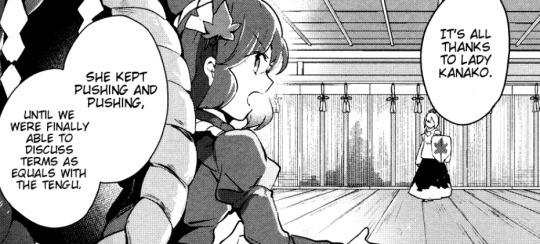
Silhouette of a tengu negotiating with Kanako in WaHH 38, sometimes labeled as Tenma on fan sites through debatable exegesis.
As we originally learned in Perfect Memento in Strict Sense, Gensokyo’s tengu are ruled by an individual named Tenma (天魔). Akyuu simply describes them as the “tengu’s boss” and provides no further information. While some additional tidbits have since surfaced here and there, they largely remain a mystery. Next to Chang’e, the unseen fourth deva of the mountain and the fourth Beast Realm figurehead they’re easily the highest profile unseen character in the entire series.
While in absence of information on the contrary we cannot necessarily assume that Tenma isn’t a given name in Touhou, ZUN did not actually come up with this term. It has been a significant part of tengu background at least since the Kamakura period. It can be translated as “heavenly demon”, and it’s a shortened form of Dairokuten Maō (第六天魔王), “Demon King of Sixth Heaven”, the Japanese name of Mara. Tenma is explained as a synonym of Mara’s “personal name” Hajun (波旬; Sanskrit Pāpīyas) for instance in the treatise Makashikan (摩訶止観; translation of Chinese Móhē Zhǐguān, “Great Cessation and Insight”).
Is that all there is to the mystery of Tenma? For what it’s worth, a possible reference to the full form of Mara’s name can be found in a description of Okina’s ability card in Unconnected Marketeers, which mentions “Tenma living in paradise”. I don’t think this is very strong evidence, though.
Touhou aside, it is hard to deny tengu are fundamentally tied to Mara. They are directly described as his subjects in Buddhist works such as Soseki Musō’s (1275–1351) Muchū mondō (夢中問答集; “Questions and Answers in Dreams”) and Unshō’s (運敞; 1614–1693) Jakushōdō Kokkyōshū (寂照堂谷響集). However, it needs to be stressed that a being referred to as Tenma does not necessarily have to be Mara himself.
A plurality of Maras theoretically became possible as soon as the belief this name didn’t designate an individual, but rather a position which could be held by various individuals or a category of beings developed in Buddhism. The former idea already appears in the Māratajjanīya, a part of the Theravada Buddhist Majjhima Nikāya, dated to the late first millennium BCE or early first millennium CE. Maudgalyāyana, one of the disciples of the historical Buddha, reveals in it that he was (a) Mara in a past life, and thus can easily notice the presence of the present Mara. The shift from a singular Mara (魔, mo) to an assortment of “demon kings” (魔王, mowang) is also well documented in early Buddhist sources from China.
As a curiosity it’s worth noting that even though the terms mo and mowang originally referred to strictly Buddhist demons, they were also incorporated into Daoist traditions, especially Lingbao and Shangqing. For example the former school's central text Duren Jing (度人經; “Scripture for Universal Salvation”) maintains that multiple mowang exist.
While some of these “demon kings” are tempters not too dissimilar from their Buddhist forerunner (though what they obstruct is attaining the distinctly Daoist form of transcendence - in other words, immortality), others are portrayed as judges responsible for determining the fates of people in the afterlife. In later sources the term mo sometimes also refers to supernatural pathogens (generally 邪, xie or 邪氣, xiequi).

Sun Wukong and his fellow pilgrims battling the Bull Demon King on a mural from the Summer Palace in Beijing (wikimedia commons)
You don’t really need to look for any particularly obscure sources to see this transformation of Mara into a generic moniker, though - even the Bull Demon King from Journey to the West has the compound 魔王 in his name. Same goes for numerous other antagonists from this work.
When it comes to Japanese sources, it also doesn’t require looking for anything particularly obscure to find evidence in the belief in multiplicity of ma or tenma.
In the historical epic Heike Monogatari, emperor Go-Shirakawa implores Sumiyoshi Daimyōjin to explain the nature of tenma to him. He reveals that this term refers to monks and scholars who, despite nominally following Buddhism, lacked the mindset needed to attain enlightenment. He compares them to birds of prey, but also states they belong to the “dog species”. All of these are nods to well established beliefs about tengu, which I discussed in my previous article, with a reference to the writing of their name on top of that.
It comes as no surprise that right after that Sumiyoshi Daimyōjin specifies that “the wise men of the eight sects who become tenma are called tengu”. He also makes it clear the tenma are quite numerous: “nine out of ten will definitely become tenma and try to destroy the Law of Buddha,” he warns.
A plurality of tenma can also be found in assorted biographies of pious Buddhist reborn in a pure land, so-called ōjōden (往生伝). The Tendai treatise Asabashō (阿娑縛抄) attributes the ability to “subdue all tenma” - evidently a class of beings, not an individual - to Fudō Myōō.
Through the rest of the article, I will introduce some of these tenma - the most famous tengu. My goal is not to convince you that any of them is a uniquely plausible candidate for the role of the unseen Touhou Tenma - I merely would like to point out there are multiple interesting options.
The oneness of vice and virtue: Ryōgen, the ruler of Makai
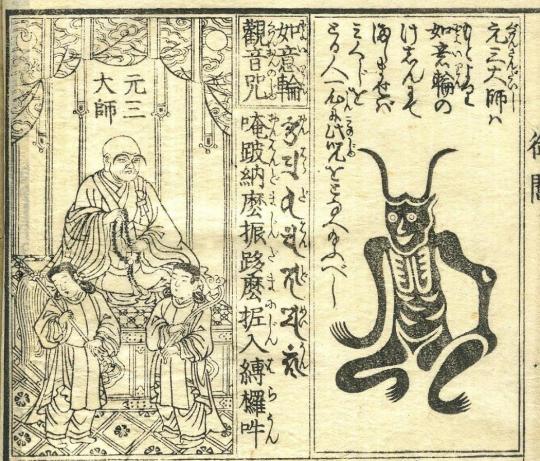
The historical Ryōgen (left) and his deomic alter ego Tsuno Daishi (wikimedia commons)
Before Ryōgen (912–985) came to be seen as a tengu, he was one of the most influential members of the Tendai school of Buddhism to ever live. He reformed the Enryaku-ji complex on Mt. Hiei, took part in numerous theological debates, and gained the favor of the imperial court by supposedly enabling the birth of an heir of emperor Murakami with his prayers. He was also renowned as a master of esoteric protective rituals.
The proponents of the Tendai establishment understood him as a fearsome protector of this tradition. As early as 50 years after his death, in the 1030s, he came to be identified as the reincarnation of Tendai’s founder Saichō. He was also considered a manifestation of one of the eight dragon kings, Uhatsura (優鉢羅; from Sanskrit Utpalaka). Ōe no Masafusa states that in this form he continued to protect Mt. Hiei, instead of being reborn in a pure land. This idea continued to spread, and by the end of the Kamakura period he came to be commonly revered as a protective figure by all strata of society. Haruko Wakabayashi notes that only Kūkai developed a similar cult in Japan as far as patriarchs of the esoteric Buddhist schools go.
It was not Ryōgen’s ability to navigate complex doctrinal debates about the interpretation of sutras that resulted in his popularity, but rather his esoteric skills. He was supposedly uniquely accomplished when it came to subduing anything which could be described as ma. In a Konjaku Monogatari tale I’ll discuss in more detail later, he effortlessly overcomes a tengu, for instance.
However, in addition to spiritual obstacles and demons, the ma he was supposed to conquer also included political opponents, rebels or brigands, as the Buddhist law and the interests of the state were understood as identical. Ryōgen’s efficiency was so great he came to be viewed as a manifestation of Fudo Myōō, one of the wisdom kings and the conqueror of ma par excellence.
Not everyone viewed Ryōgen positively, though. The earliest criticism came from his contemporaries. It was argued that he favored monks from aristocratic families, and that he lived in luxury unbefitting for a monk. Furthermore, numerous conflicts between monks erupted during his tenure as Enryakuji’s abbot, including the split between the Sanmon and Jimon lineages. Since in some cases this led to armed confrontations, later on he was blamed for essentially enabling the rise of militarized monks who commonly caused disturbances on Mt. Hiei.
The real breakthroughs were not these tangible “political” criticisms. Rather, it was the identification of Ryōgen as ma, which arose due to conflict between various schools of Buddhism in the early middle ages. Most commonly this meant portraying him as a tengu - as I explained in my previous article, the form arrogant or corrupt monks were believed to take. A variant tradition described him as an oni, though according to Bernard Faure this likely simply reflects a degree of interchangeability between them and tengu.
Ryōgen is arguably the most famous historical monk to be furnished with such a literary afterlife. An early example can be found in the Hōbutsushū from the twelfth century, which states that this was a result of his attachment to Enryaku-ji. In Jimon Kōsōki (寺門高僧記) it is instead his investment in doctrinal debates that made him unable to attain rebirth in a pure land.

A gathering of tengu leaders from Tengu Zōshi (wikimedia commons)
Since Ryōgen was no ordinary monk, his tengu self also had to be special. In the Tengu Zōshi (天狗草紙), he is described as the ruler of all tengu and the realm they inhabit, Makai (“world of ma”; also referred to as Tengudō). It's worth pointing out the notion of Makai being a place where monks turn into specific classes of supernatural beings is basically a core part of UFO’s plot, and in SoPM Miko even wonders if Byakuren shouldn’t be considered a tengu.
As a ruler of Makai, Ryōgen came to be referred to as a “demon king”, maō (魔王). An example can be found in the historical epic Taiheiki, where he is described as one of the “great demon kings” (大魔王, daimaō) who debate how to cause chaos in Japan. He is assisted by vengeful spirits of the emperors Sutoku (more on him later), Go-Toba and Go-Daigo; two members of the Minamoto clan who sided with Sutoku, Tameyoshi and Tametomo; and the monks Genbō, Shinzei (真済, 800-860; obscure today, but apparently well known as a monk turned tengu in the middle ages) and Raigō (who supposedly turned into the infamous “iron rat”).
In Hirasan Kojin Reitaku (比良山古人霊託; “The Spiritual Oracle of the Old Man of Mount Hira”) this is only a temporary fate, though: supposed by the time this work was compiled, he already managed to leave Tengudō. As I discussed last month, this reflects a fairly standard belief too: to become a tengu, one had to actually be a Buddhist, and while it made striving for enlightenment more difficult, it did not mean eternal damnation or anything of that sort. A tengu could still choose to pursue rebirth in a pure land - it was just more difficult than for a human.
The evolution of Ryōgen’s image didn’t end with the establishment of his new role as a king of tengu, or even with the arguments that he might have nonetheless subsequently attained enlightenment. By the end of the Kamakura period, he came to be worshiped explicitly in the form of a “demon king”. While initially polemical, this image of him came to be subverted by Tendai monks to their own ends. They asserted that Ryōgen did not enter the realm of ma because of his arrogance, but rather consciously chose to do so in order to protect Buddhist principles. By becoming the ruler of its inhabitants, he also became their ultimate conqueror.
The notion of a being who is simultaneously essentially Mara-like and a protector of Buddhism seems contradictory. That’s actually the intent here. Through the middle ages, the esoteric schools of Buddhism developed the notion of hongaku, or “original enlightenment”. In its light, opposites were in fact identical. Buddha was the same as Mara (魔仏一如, mabutsu ichinyo). As it was argued, to attain Buddha nature one had to understand and experience delusion as well. Thus virtuous individuals could become demon kings in order to freely control evil beings.
In addition to its deep philosophical implications, the hongaku theory was also used to reject criticisms of the Buddhist establishment. Enjoying luxuries was but a way to better understand delusion, and thus to advance along the path to enlightenment. Its proponents embraced some criticisms of Ryōgen: he did favor nobles, accumulate wealth and live arrogantly. He did become a powerful tengu. But all of this was in fact part of a noble goal. And on top of that, as a demon king he was an even more fearsome protector of Tendai than he would be otherwise.
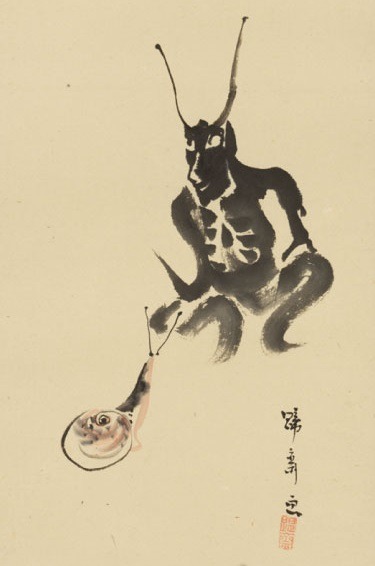
"Tsuno Daishi and a snail" by Teisai Hokuba (Sumida Hokusai Museum; reproduced here for educational purposes only)
The new role of Ryōgen warranted new iconography. While formerly portrayed simply as a monk holding the expected priestly attributes, in the Kamakura period he came to be depicted as Tsuno Daishi (角大師), the “Horned Master”. This image spread far and wide due to the development of a belief that hanging depictions of Ryōgen would guarantee the same protection Tendai institutions received from him. He came to be seen as particularly efficient in warding off disease.
Many temples still distribute talismans depicting Tsuno Daishi today. This custom received a lot of press coverage in the early months of the COVID pandemic, and you might have seen some examples on social media.
From vengeful spirit to tengu: the case of emperor Sutoku
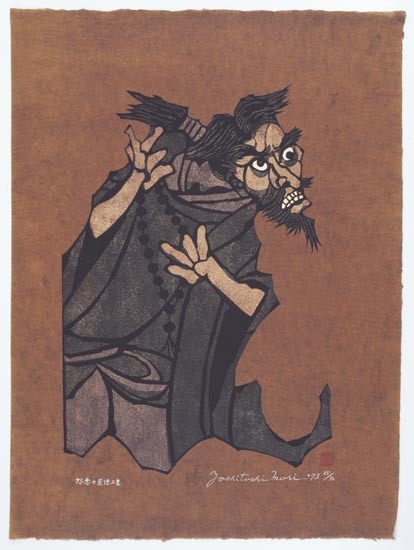
Sutoku, as depicted by Yoshitoshi Mori (Tokyo's National Museum of Modern Art; reproduced here for educational purposes only)
Sutoku has much in common with Ryōgen - he was also a historical figure who purportedly became a tengu. However, he was not a monk, but rather an emperor. He reigned from 1123 to 1142, when he was forced to abdicate in favor of his half brother Konoe.
Konoe passed away in 1155, but Sutoku was not allowed to return to the throne. It was instead claimed by another half brother, Go-Shirakawa. Sutoku decided that’s enough half brothers seizing a position he believed was still rightfully his, and plotted an uprising. This culminated in the Hōgen Disturbance of 1156. Alas, planning seemingly wasn’t his strong suit, since the conflict was essentially resolved before it even started. Go-Shirakawa’s forces defeated Sutoku’s before they even left their encampment.

Sutoku as a vengeful spirit, as depicted by Kuniyoshi Utagawa (wikimedia commons)
In the aftermath of his failed rebellion, Sutoku was exiled to Sanuki, where he eventually passed away in 1164. However, his memory lingered on. He most likely came to be widely perceived as a vengeful spirit after the great fire of Angen broke out in Kyoto in 1177. Other subsequent disasters, including the Genpei war (1180-1185) and the 1181 famine, strengthened the belief that he was punishing his enemies from behind the grave. However, he didn’t become just any vengeful ghost, but one of the three greatest members of this category ever, next to Sugawara no Michizane and Taira no Masakado.
Sutoku was, in a way, the sum of many of the greatest fears of medieval Japan. The belief in his rebirth as a vengeful ghost coexisted with a tradition presenting him as a tengu - arguably one of the greatest tengu ever. This status is firmly ingrained into his image in later sources. Today he is frequently included in modern groupings of “three great youkai” alongside Shuten Dōji and Tamamo no Mae. It seems sometimes he’s replaced by Ōtakemaru, but honestly I think he is more worthy of this spot, and also even though this is ultimately a synthetic modern group, it’s much more representative of medieval culture to have a tengu alongside an oni and a fox.

A strikingly tengu-like vengeful Sutoku, as depicted by Yoshitsuya Utagawa (wikimedia commons)
While peculiar, Sutoku’s dual role as a tengu and a vengeful spirit is not entirely unique. Initially these two categories were pretty firmly separate. Tengu obstructed attaining enlightenment and rebirth in a pure land; vengeful ghosts, as their name indicates, were focused on personal vengeance. However, in popular imagination they overlapped, as evident for example in members of both groups scheming together in the Taiheiki. This most likely reflects the overlap between the perception of enemies of Buddhism and enemies of the state. Vengeful ghosts were typically members of factions who lost one political struggle or another, and their vengeance was aimed at the establishment.
Regardless of Sutoku’s supernatural taxonomic position, his post-mortem fate is tied to the fact he was a devout Buddhist. All accounts of his exile stress that he spent much of his time copying sutras. According to a rumor first attested in 1183, he also wrote a curse on their backs using his own blood, vowing to become a “demon king” - (a) Mara - due to perceived injustice he faced. There is no evidence it’s based on a historical event, even though it’s not impossible Go-Shirakawa did believe in it. At the very least, he definitely saw the deceased Sutoku as a supernatural threat, as he had various ceremonies performed in hopes of pacifying him.
Hōgen Monogatari, composed in the early fourteenth century, asserts that he became a tengu while he was still alive. When his request to deposit the completed manuscripts in a temple in Kyoto was denied by Go-Shirakawa, he vowed to remain his enemy in future lives, and stopped cutting his nails and hair. This symbolically marked his transformation. However, a former emperor couldn’t just become any tengu. Therefore, for instance in the Taiheiki he is described as a leader of the tengu, and his bird form is that of a golden kite.
Up to 2022, the Touhou wiki used to claim that “among Touhou fans, it is almost a general idea that the Tenma is inspired by Grand Emperor Sutoku” (not sure what is the “grand” doing here, there’s no such a title as daitennō as far as I am aware, but I digress), as you can see here. I will admit I’ve never encountered this headcanon - you will generally be hard pressed to find Touhou headcanons relying on actual mythology that aren’t just some variety of power level wank or otherwise all around awkward - so I think removing it was the right move (I don’t think the replacement is any better considering Mara is not a “Hindi god” - Hindi is a language, not a religion - but that’s another problem).
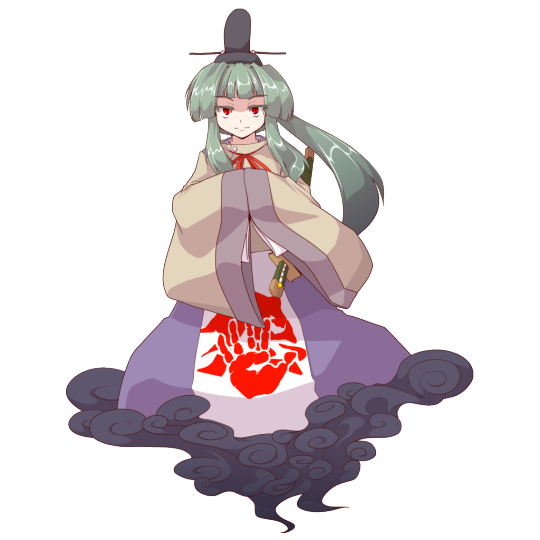
I’m also not aware of any Sutoku fan characters save for Tenmu Sutokuin from the fangame Mystical Power Plant who isn’t even supposed to be a take on the canon Tenma. Design-wise she clearly leans more into the vengeful spirit side of things (to the point the design would work better as Michizane than Sutoku, really, though I don’t dislike it). The filename on the wiki misspells her name as Tenma, but I have no clue whether this has anything to do with the strange headcanon assertion from the Tenma article. The closest thing to a Tenma reference she gets is a spell card referencing the sixth heaven, but the game refers to her merely as a “great tengu”.
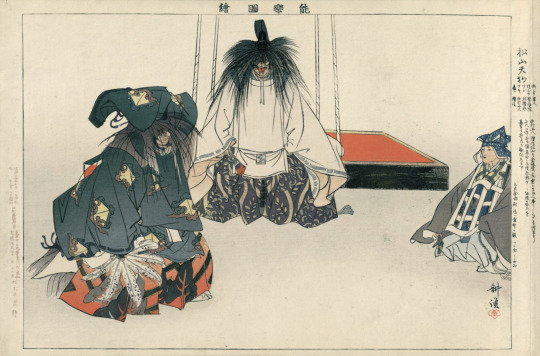
Kōgyo Tsukioka's illustration of a performance of Matsuyama Tengu, with actors playing Saigyō, Sutoku and another tengu (wikimedia commons)
MPP aside, there's a lot of room for Sutoku in Touhou. The poet-monk Saigyō, whose life and works served as a loose inspiration for the plot of Perfect Cherry Blossom and Yuyuko’s character, went on a journey through locations associated with the late ex-emperor four years after his death, in 1168. He felt a personal connection to him because before being ordained he served as a guard of the imperial palace during his reign. This unconventional pilgrimage to at the time peripheral, sparsely inhabited areas was both a form of paying respect to his former superior, and possibly a way to pacify his vengeful spirit.
Saigyō obviously did not meet the deceased Sutoku, and ultimately only two of his poems deal with his downfall. However, later legends kept expanding upon their connection. This eventually culminated in the development of a tale according to which the monk in fact encountered Sutoku in the form of either a vengeful spirit or a tengu. The noh play Matsuyama Tengu is based on it. Its title is derived from the name Sutoku’s first residence after his exile. As a curiosity it’s worth pointing out the play singles out Sagamibō (相模坊), the tengu of Mt. Shiramine, as an ally of Sutoku - an ideal candidate for a stage 5 sidekick, if you ask me.
Some further interesting developments regarding Sutoku’s tengu identity took place in the Edo period, but I’ll discuss them in a separate section later.
The other tengu emperor: Go-Shirakawa
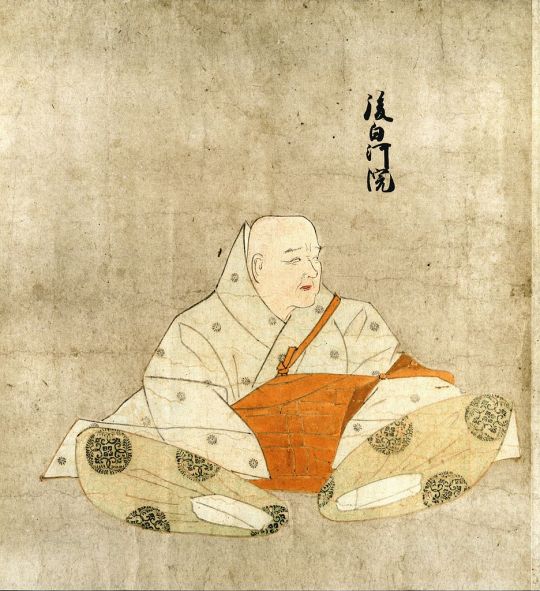
A portrait of Go-Shirakawa (wikimedia commons)
While Sutoku’s opposition to Go-Shirakawa essentially was the first step to the development of the belief he was a tengu, the latter also came to be viewed as a member of this category. While still alive, no less. One of the first sources to identify him as a tengu is a letter of his contemporary Minamoto no Yoritomo. He refers to the emperor as the “greatest tengu of all Japan” because of his notoriously fickle political positions. He at one point approved Minamoto no Yoshitsune’s plan to suppress Yoritomo, just to reverse this decision and declare Yoshitsune is acting on behalf of a tenma.
The notion of Go-Shirakawa being a tengu is present in the Heike Monogatari as well. In the scene I already mentioned, Sumiyoshi informs Go-Shirakawa that extensively studying Buddhist texts made him arrogant, and that he’s already attracting the attention of tengu. It is just a matter of time until he will be reborn as one of them himself. Stressing his religiosity is meant to show how it is possible for him to become a tengu in the same manner as monks.
Go-Shirakawa’s tengu career arguably peaked with his portrayal in Hirasan Kojin Reitaku. It states that both him and Sutoku became tengu, but it is the former whose “power is beyond comparison”. However, he plays no bigger role in the narrative, and he’s not described as a leader of the tengu, or even as the most powerful of them. In the absence of Ryōgen, it is apparently his contemporary Yokei (余慶; 919-991) who became the most powerful tengu. Go-Shirakawa doesn’t even get to be the second most powerful - that’s apparently Zōyo (増誉; 1032–1116). As far as I am aware, no distinct legends about these monks becoming tengu exist, so much like the elevated position of Go-Shirakawa this seems like a peculiarity of Hirasan Kojin Reitaku.

Early twentienth centiury depiction of a typical shirabyōshi costume (wikimedia commons)
While Go-Shirakawa doesn’t appear in any particularly significant pieces of tengu literature otherwise, his personal quirks are responsible for a somewhat obscure aspect of tengu background. A further detail revealed in the Hirasan Kojin Reitaku is that tengu are connoisseurs of all sorts of performances, but enjoy the dances of shirabyōshi in particular. know, I brought this up already in the previous article, but I think it’s a fun detail. Think of the sheer potential of a tengu shirabyōshi character (whether in Touhou context or elsewhere), also.
From celebrated saint to reviled tengu and back again: Ippen

A statue of Ippen from Hōgon-ji, apparently destroyed in a fire in 2013 (wikimedia commons)
Ippen is here more as a curiosity than anything, since he isn’t really a mainstay of tengu literature. Like Ryōgen and the two emperors-turned-tengu, he was a historical figure. He lived from 1238 to 1289 and founded the Jishū school of Pure Land Buddhism. He spent much of his life as a wandering preacher, advocating a unique form of nenbutsu (chanting the name of Amida), the self-explanatory nenbutsu dance (念仏踊り, nenbutsu-odori).
Legends assert that various miracles occurred thanks to Ippen’s devotion. For instance, at one point the nenbutsu dance he initiated made flowers fall from the sky. On another occasion, purple clouds appeared above him. Stories of his various miraculous deeds were retold in the form of picture scrolls, such as Ippen Hijiri-e (一遍 聖 絵; “The Illustrated Biography of Ippen”).
Ippen’s activity, in particular the dance he promoted, was evidently controversial among his contemporaries. Tengu Zōshi refers to him as the “chief tengu”, and portrays the practices he spread negatively. An entire explanatory paragraph is devoted to stressing the disruptive character of nenbutsu he promoted. Alongside other unorthodox behaviors it is blamed for various social ills including the fall of the Song dynasty in China (sic).
The opposition of other Buddhist schools to certain early currents within the Pure Land movement was often rooted in the rejection of the worship of deities and even Buddhas other than Amida. Of course, today it’s not hard to find people incorrectly convinced Buddhism is a “religion without gods” (this is a phenomenon so widespread it was actually considered a major obstacle by researchers of the history of Buddhism). However, through the middle ages devas, kami, Onmyōdō calendar deities and various figures like Dakiniten or Matarajin who defy classification altogether were anything but marginal in most schools of Buddhism in Japan. Oaths were sworn by Taishakuten and his entourage, Enmaten and Taizan Fukun were invoked in popular rites meant to guarantee good fortune, and so on.
Interestingly, Tengu Zōshi does not deny that miracles attributed to Ippen really happened. In fact, they are even depicted in the illustrations. However, the reader is expected to realize they are implicitly not a genuine display of Buddhist holiness, but merely a tengu trick meant to lead people astray. This is essentially a twist on stories already common in the Heian period, something like the tengu pretending to be a Buddha in a famous story from the Konjaku Monogatari adapted to reflect the anxieties of the Kamakura period tied to new religious movements.
The condemnation of Ippen goes further than merely implying his miracles were trickery, though. While in the final section of the scroll it is revealed that with enough effort even a tengu can attain buddhahood, Ippen is singled out as incapable of that. He is destined to fall even further from grace and to be reborn in the realm of beasts.
Despite the circulation of such negative opinions about Ippen among his contemporaries, Jishū school ultimately survived past the Kamakura period, and it still exists today.
Tengu caught between history and fiction: Tarōbō
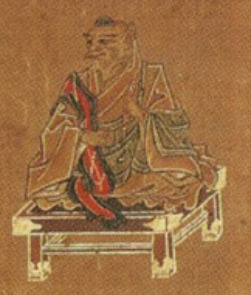
Tarōbō in a mandala from Mt. Atago (via Patricia Yamada's Bodhisattva as Warrior God; reproduced here for educational purposes only)
Tarōbō (太郎坊) is the tengu of Mount Atago. This location’s association with the tengu is well attested, and for instance in Hirasan Kojin Reitaku multiple of them are said to reside there, including Yokei, Zōyo and Jien.
However, Tarōbō is not identical with any of these historical monks. He’s an interesting case because it would appear he stands exactly on the border between historical figures and literary characters. One of the first attestations of him, if not the first one outright, has been identified in the Tengu Zōshi. On an illustration showing a gathering of tengu leaders, who are mostly identified by the names of schools of Buddhism they represent, one is instead given a specific name, Atago Tarōbō (愛石護太郎房). His notoriety continued to grow in later sources: Taiheiki presents him as a well known tengu, while Heike Monogatari outright labels him the “greatest tengu in all of Japan”.
While Tengu Zōshi and other early sources don’t provide any information about Tarōbō’s origin, in later tradition he came to be identified with the legendary Korean monk Nichira (日羅). His name would be read as Illa following the Hanja sign values, and at least some authors prefer using this reading or list both. I’m sticking to Nichira here, to maintain consistency with a name sometimes used to refer to his tengu form, Nichirabō (日羅坊; “the monk Nichira”).
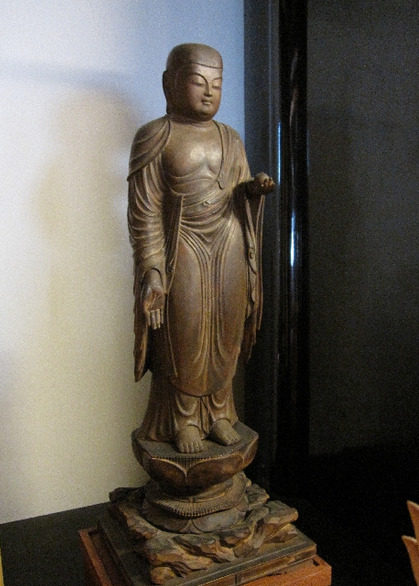
A statue of Nichira (amagasaki-daikakuji.com; reproduced here for educational purposes only)
Nichira is mentioned for the first time in the Nihon Shoki, in the section dedicated to the reign of emperor Bidatsu (late sixth century). He is described as an inhabitant of Baekje, one of the three Korean kingdoms which existed at the time. However, his father came there from Japan. The emperor seeks his help with navigating foreign policy. After some tribulations - apparently the king of Baekje didn’t want to let him go - he finally arrived in Japan in 583, armed and on horseback. He starts acting as an advisor to the emperor.
After a few months, Nichira is assassinated by other Baekje envoys present in the court since he wants the emperor to pursue rather aggressive foreign policy (most notably, he suggests ruthlessly slaughtering any potential settlers from Baekje who would try to establish settlements in Japan). The assassination has to be delayed, because he emits supernatural light at night. That’s not where his apparent supernatural powers end - after being killed he resurrects for a moment in order to make it clear his assassination was not a plot of Silla (another Korean kingdom). He is later buried, and no further mention is made of him.
While some elements of the Nihon Shoki account were retained in later legends about Nichira, especially his arrival from Korea and his ability to emit a supernatural glow, he was otherwise essentially entirely reinvented. Instead of an advisor of emperor Bidatsu, he came to be portrayed as a Buddhist monk and as an ally of prince Shotoku.
An early example of such a legend is preserved in Nihon Ōjō Gokuraku-ki (日本往生極楽記; “Japanese records of rebirth in a Pure Land”) from the late tenth century. It states that Nichira met with Shotoku when the latter was still a child, and declared he was a manifestation of Kannon. The prince in response recognized him as the reincarnation of one of his disciples from an unspecified past life. We also learn that he is capable of emitting light because of his devotion to Surya, the personification of the sun. There’s no real chronological issue here: while Nihon Shoki doesn’t mention Shotoku (or Buddhism, for that matter; it first comes up a year after Nichira’s death there) in any passages dealing with Nichira, the prince would indeed be a kid at the time of his arrival.
Things get more complicated later on. True to his portrayal as a ruthless enthusiast of military operations, Nichira came to be described as aiding Shotoku in quelling Mononobe no Moriya and his allies. Following the conventional chronology this would have happened long after Nichira’s death, though. A possible attempt at reconciling obviously contradictory traditions can be found in Ōe no Masafusa’s Honchō Shinsenden (本朝神仙伝), as you might remember from the Ten Desires post from last year.
In contrast with virtually every other source dealing with Shotoku’s genealogy, Masafusa claims the prince was a son of Bidatsu, which would make him considerably older at the time of Nichira’s arrival. The meeting between them is fairly similar to the Nihon Ōjō Gokuraku-ki version: Nichira recognizes Shotoku as a manifestation of Kannon, and both of them then emit supernatural light. No mention is made of any military help, though.
The portrayal of Nichira as a military ally of Shotoku is present in legends which link him with tengu. After the defeat of Moriya, he supposedly left to take over Mt. Atago. According to a guide to famous places (名所記, meishoki) from 1686, Kyōwarabe (京童; “Children in Kyoto”) by Kiun Nakagawa (中川喜雲; 1636-1705) he did so in the form of a tengu.
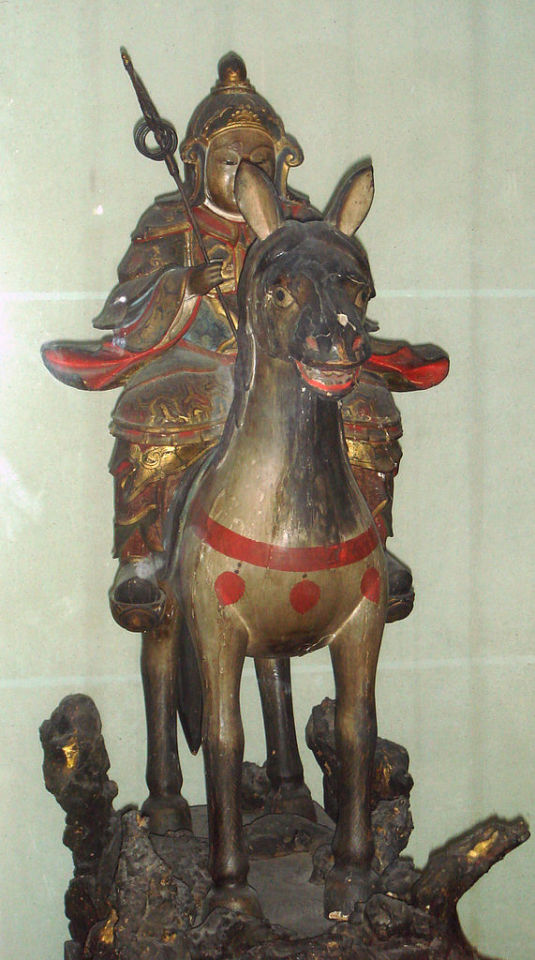
Atago Gongen (wikimedia commons)
Bernard Faure notes there is a similar legend in which Nichira is a separate figure from Tarōbō. The former, portrayed as a military official in the service of prince Shotoku, sets on a journey to pacify the tengu of Mt. Atago. He accomplishes this by revealing he is a manifestation of Shōgun Jizō (勝軍地蔵), a Kamakura period reinterpretation of this normally peaceful bodhisattva as a fearsome warrior, historically worshiped on Mt. Atago as Atago Gongen. Nichira then becomes the leader of the tengu, while Tarōbō provides him with information about the mountain.
Something that surprised me is that there is a single Korean source which mentions the tradition presenting Nichira as a monk who became a tengu. During the Imjin war, a failed Japanese invasion of Korea, the Korean Neo-Confucian philosopher Kang Hang was captured and subsequently spent three years (from 1597 to 1600) in Japan as a prisoner of war before escaping (possibly with the help of Seika Fujiwara, a fellow Neo-Confucian scholar he befriended). He wrote a memoir dealing with this experience, Kanyangnok (“The record of a shepherd”) in which he mentions Nichira in passing. He states that he was known as Tarōbō, and that he was enshrined and worshiped as Atago Gongen.
Something that’s worth pointing out is that despite living centuries apart, Ōe no Masafusa and Kang Hang both make the same mistake, stating that Illa arrived in Japan from Silla, as opposed to Baekje. I thought this might represent an alternative tradition, but in both cases translators pretty firmly conclude we’re dealing with a mistake. My best bet would be that this has something to do with the Japanese name of Silla, 新羅, sharing a kanji with Nichira’s own name; the name of Baekje, 百済, does not. It doesn’t seem any later legend brings up his post-mortem effort to clear the name of Silla envoys from the Nihon Shoki, so I don’t think that was necessarily a factor.
I’m actually shocked I haven’t seen a Touhou take on Nichira, considering his association with Shotoku. In particular, it’s worth pointing out that his transformation into a tengu is essentially how people tend to mistakenly assume the connection between Matarajin and Hata no Kawakatsu works (in reality, it’s very limited in scope and indirect, but that’s a topic for another time). Plus there’s a lot of storytelling potential in having a tengu - or even Tenma - be yet another character from Miko’s past. ZUN isn’t very interested in building upon prince Shotoku legends involving Kawakatsu or Kurokoma, but it’s hard to deny they’re a popular topic in fanart.
Yet another tradition about the identity of Tarobō, as far as I can tell entirely independent from his connection to Nichira, is preserved in the Engyōbon, the oldest version of Heike Monogatari. A gloss states that he is the tengu form of the monk Shinzei (真済; 800-860), who in a tale from Konjaku Monogatari and a variety of other sources menaced empress Somedono (染殿后; Fujiwara no Akirakeiko), the wife of emperor Seiwa.
Tarōbō also plays a role in a tale unrelated to speculation about his origin, Kuruma-zō Sōshi (車僧草紙; “Tale of the handcart priest”). It was originally composed in the sixteenth or seventeenth century. The eponymous protagonist is a Zen practitioner who, as his name indicates, travels with his handcart in tow. Tarōbō attempts to convince him to abandon this lifestyle. They engage in a Zen dialogue (mondō), in which the monk triumphs over the tengu. He also manages to overcome Tarōbō’s subordinates who attempt to make him stray away from his practice by showing him gruesome images of battles in the realm of the asuras.
Finally, under the name Nichirabō Tarōbō appears in the tale of Zegaibō. Initially I planned to only dedicate a single paragraph to it, but I figured Zegaibō is such a fun figure that a separate section is warranted.
Not a tiangou: Zegaibō, the Chinese tengu
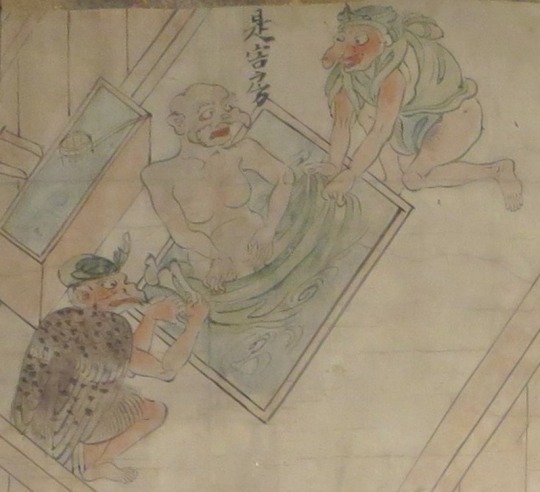
Zegaibō taking a bath (wikimedia commons)
The history of Zegaibō (是害坊) starts before he even got this name. In the anthology Konjaku Monogatari, there are a handful of stories about tengu arriving in Japan from overseas - specifically from India or China. These are obviously literary fiction, as there is nothing quite analogous to tengu in Indian literature, and while their name is borrowed from Chinese tiangou, this term also doesn’t have all that much to do with tengu, ultimately.
One of the aforementioned stories focuses on a Chinese tengu named Chira Yōju (智羅永寿; I was unable to establish whether there’s any connection with 智羅天狐, the alternate name of Iizuna Gongen, Chira Tenko) He arrives in Japan to challenge local Buddhist monks. He reveals that he has previously bested these in his homeland successfully, and that he would like to check how their Japanese peers compare. Local tengu take him to Mt. Hiei, where he unsuccessfully tries to bait major Tendai monks, including Ryōgen, into battling him. He is eventually beaten up by Ryōgen’s attendants, and after his defeat the Japanese tengu take him to a hot spring so that he can recover. In the end he decides to return home.
It was possible to establish that Chira Yōju was the basis for the tale of Zegaibō because the colophon of an illustrated scroll known simply as Zegaibō Emaki (是害坊絵巻) states that the story draws inspiration from a similar tale from the lost collection Uji Dainagon Monogatari. Based on other sources it is assumed it was most likely identical with the Konjaku Monogatari account of the misadventures of Chira Yōju. Save for the change of the main character’s name, the stories do not differ much. More time is dedicated to the meeting between Zegaibō and the Japanese tengu, though. They are led by Nichirabō from Mt. Atago.
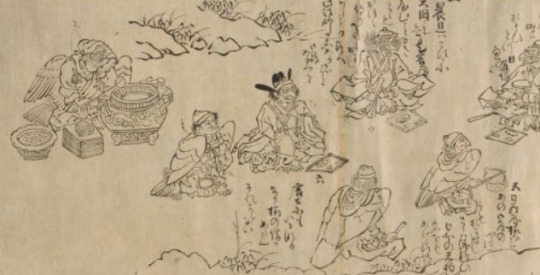
Zegaibō meeting with his Japanese peers (New York Public Library Digital Collections)
Zegaibō evidently became a popular, recognizable character later on. This might reflect a sense of patriotism (or nationalism) the story possibly could have inspired in the readers: the Japanese monks are portrayed as more resistant to the schemes of demons than their continental peers, after all. However, it’s also possible that Zegaibō’s defeat was interpreted as a take on tensions between Buddhist monks and shugenja, considering the latter were commonly compared with tengu.
Regardless of which interpretation is correct, Zegaibō’s undeniable popularity allowed him to reappear in a variety of other tales. There is a noh play which simply adapts the tale about him, Zegai. The events are largely the same, though the name Tarōbō is used instead of Nichirabō to refer to the tengu of Mt. Atago. Bernard Faure mentions that in one version of the legend about Nichira’s arrival on Mt. Atago, he defeats Zegaibō, here portrayed as the leader of the local tengu. The tengu subsequently reveals the “sacred geography” of Japan to him. Finally, Zegaibō plays a major role in the Edo period puppet play Shuten Dōji Wakazakari (酒呑童子若壮; “Shuten Dōji in the Prime of Youth”).
In this work, Zegaibō is indirectly responsible for the transformation of the eponymous character into an oni. After a rampage which left 160 monks dead and various other heinous acts, the young Shuten Dōji, known simply as Akudōmaru (悪童丸; “evil child”), proclaims that there has never been anyone more mighty than him in Japan, China or India. This display of arrogance alerts Zegaibō, who appears in the guise of a young monk and offers to wrestle with him so that he can prove his strength. However, as soon as the fight starts, he reveals his true form and takes Shuten Dōji into the air.
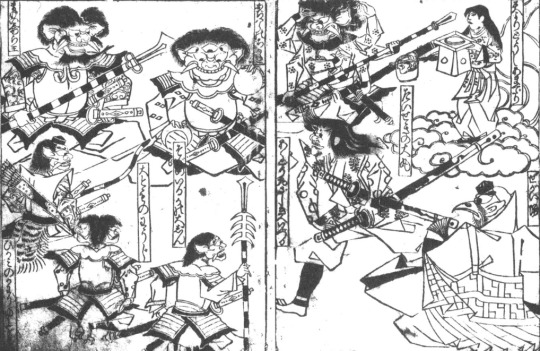
Zegaibō presents Akudōmaru to Maheśvara (via Keller Kimbrough's Battling Tengu, Battling Conceit; reproduced here for educational purposes only)
Zegaibō then brings his opponent to Maheśvara (摩醯首羅王, Makeishuraō; a phonetic transcription is used in place of the most common Japanese form 大自在天, Daijizaiten). The latter is unexpectedly described as a maō. Zegaibō seemingly presumes that his boss will punish the unruly human by turning him into a tengu, but Maheśvara is so impressed by his bravery that he chooses to turn him into an oni to let him cause even more chaos. This is rather obviously distinct from the more widespread versions I discussed in the not so distant past.
From makara to tengu: Konpira
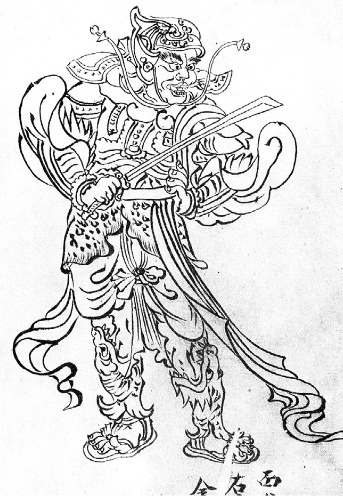
A typical depiction of Konpira as one of the heavenly generals (via Bernard Faure’s Rage and Ravage; reproduced here for educational purposes only)
While Zegaibō according to tales focused on him arrived from China, there is technically a tengu whose origins were believed to lie even further away - Konpira (金比羅). However, he is a special case because despite being arguably one of the most famous tengu, he actually wasn’t viewed as a member of this category for most of his history.
Konpira is a Japanese transliteration of Sanskrit Kumbhīra. This name can be literally translated as “crocodile”. His origin is poorly understood, though it is possible he was originally essentially a divine representation of reptilian inhabitants of the Ganges. As you can read here, the gharial, the mugger crocodile and the saltwater crocodile all can be found in this river in some capacity.
Fittingly, Kumbhīra is sometimes described as a makara who converted to Buddhism. This term refers to a type of partially crocodilian mythical hybrid, most notably depicted as the steed of Hindu deities such as Ganga and Varuna. Bernard Faure suggests that in Japan he might have been analogously understood as a wani at first. However, Kumbhīra could also be portrayed as a yaksha, for example in the Golden Light Sutra. What remained consistent is the idea that he was a fierce being converted to Buddhism.
Kumbhīra is well known as the foremost of the Twelve Heavenly Generals (十二神将, jūni shinshō). It is possible that the crocodilian Kumbhīra and the homonymous heavenly general were initially separate deities, though in Japanese context they are effectively the same. Konpira and his peers are regarded as the protectors of the Buddha Yakushi but historically were simultaneously perceived as a type of shikigami. I will only discuss this role more in my next article, though, as it is not very relevant here. All you need to know is that it made him a commonly invoked protective deity in apotropaic rituals.
An interesting legend pertaining to this aspect of Konpira’s character is preserved in the Taiheiki. When Fujiwara no Yasutada (藤原保忠; 890-936) fell ill, a Buddhist priest arrived to perform a ritual focused on Yakushi and his heavenly generals to heal him. However, as soon as he started to invoke Konpira, Yasutada got so horrified that he died. The ritual has apparently been hijacked through supernatural means, and what he heard was not the name “Konpira” but rather the phrase kubi kiran - “I’ll cut off your head”. This was an act of vengeance of the spirit of Sugawara no Michizane - Yasutada was one of the courtiers who conspired to exile him earlier. Evidently after he became a vengeful spirit he was able to essentially turn Konpira to his cause and reverse the effects of invoking him.
While the heavenly generals are associated with the Chinese zodiac, the correspondences between the individual deities and zodiacal animals aren’t really consistent. Konpira can variously be linked with the tiger, the rat or the boar, and accordingly with the northeast, north or northwest. The northeastern link is particularly significant, as in some cases it led to conflation between him and Matarajin, who as a subduer of demons was strongly associated with this direction.
A variant of the legend in which Saichō, the founder of Tendai, meets Matarajin during his journey to China identifies the latter with Konpira. Supposedly Konpira slash Matarajin was originally the protector of the Vulture Peak in India, then moved to Mount Tiantai in China, and finally reached Mount Hiei in Japan with Saichō.
The two were also equated with each other by the Tendai priest Jōin (乗因; 1682–1739) in the Edo period. However, his attempt was actually met with criticism from his contemporaries. A certain Sōji Mitsuan (密庵僧慈) wrote in 1806 that Jōin was evidently confused because Matarajin and Konpira are clearly separate deities. He concludes he evidently didn’t even read the Mahāvairocana Sutra. I’m honestly surprised ZUN didn’t reference this conflict over syncretism in any of Okina’s spell cards, it would fit right in.

Konpira Daigongen (wikimedia commons)
Despite Matarajin’s tengu credentials, which I discussed last month, the association between him and Konpira actually isn’t why the latter came to be seen as a tengu. This phenomenon instead began as an aspect of his role as the protective deity of Matsuo-ji on Mt. Zōzu (象頭山) in Shikoku. Here he came to be worshiped under the name Konpira Daigongen (金毘羅大権現). His enshrinement apparently only occurred in 1573, though according to a legend from the seventeenth century he arrived there much earlier, and already resided on Mt. Zōzu in the times of En no Gyōja. However, there is no reference to him in the few earlier sources dealing with this location. Since its name can be translated as “Mt. Elephant Head”, it has been suggested that it might have been associated with Shōten, the Japanese form of Ganesha, in earlier periods, though this remains speculative.
Despite Konpira’s new role as a mountain god, his early aquatic connections were not entirely lost. In the eighteenth century he came to be seen as a protector of maritime routes through the Seto Inland Sea and tutelary god of navigation. This reflected the growth of importance of inland maritime trade which was a result of the shogunate's ban on most foreign trade.
Interestingly, while most donations were made to Konpira by local sailors and merchants, his new role made him so famous that Chinese traders residing in Nagasaki prayed to him too, and a small shrine was even erected in that city at one point. Donations made by travelers from the Ryukyu Kingdom are recorded too. Both of these phenomena were highlighted in Edo travel books in order to stress the prestige of Konpira.
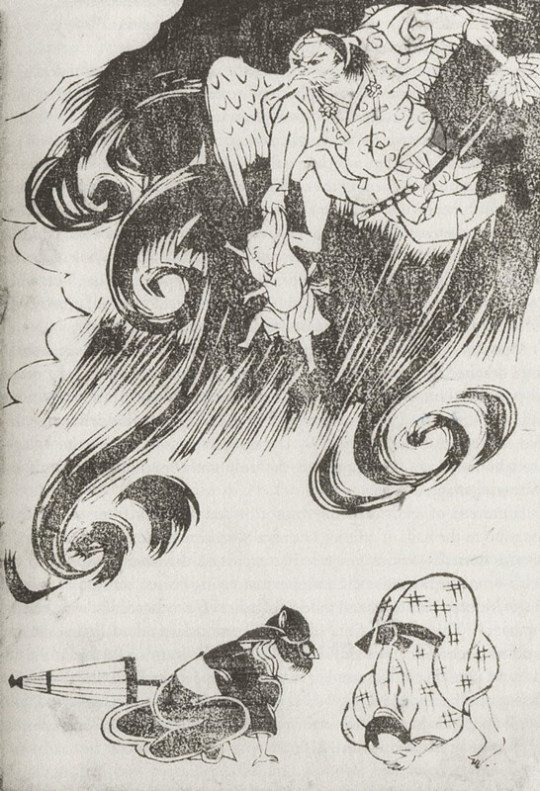
Kongōbō (Universität Wien's Religion in Japan: Ein digitales Handbuch)
Konpira didn’t become a tengu right away. The oldest recorded tradition associating Mt. Zōzu with a specific tengu refers to him as Kongōbō (金剛坊; “diamond priest”). He was not (yet) a form of Konpira, but rather a deified seventeenth century Shingon monk, Yūsei (宥盛), who between 1600 and 1613 served as the abbot of Matsuo-ji.
It seems Yūsei actually created the image of himself as a tengu on his own - in 1606 he commissioned a statue depicting him as a tengu manifestation of Fudo Myōō. The inscription explicitly states that he “entered the way of tengu” in order to bring fame to the mountain. This was a part of a bigger project of portraying himself as a master of various esoteric arts in order to gain the patronage of local nobles. After he passed away, his disciples and relatives continued spreading the image of his tengu form, now renamed Kongōbō. He eventually came to be seen as a manifestation of Konpira.
In popular imagination the new tengu-like image of Konpira eventually came to be detached from its actual origin. He was instead identified as emperor Sutoku simply because both were associated with roughly the same area - the historical Sanuki province. This idea was popularized by the 1756 play Konpira Gohonji Sutokuin Sanuki Denki (“The Sanuki Legend of the Retired Emperor Sutoku, the Original Source of Konpira”) by Izumo Takeda II. Various other authors followed in his footsteps, including Akinari Ueda and Bakin Takazawa, strengthening this equation.
While I focused on the early portrayal of Konpira and on his eventual transformations into a tengu, the traditions of Mt. Zōzu continued to evolve in subsequent centuries. After the separation of Buddhism and Shinto, Konpira came to be viewed as a kami. Due to the influence of Atsutane Hirata and his disciples he received a new name, Kotohira (金刀比羅) after the Meiji reforms. However, many lay people continued to refer to the protector of the mountain as Konpira. Today both forms of the name are in use.
Bibliography
Tumblr doesn't let me post the bibliography as a part of the article for some reason. You can find it here in the form of a google doc.
84 notes
·
View notes
Text
Gotta love that the Cognouza Ward is basically Little Nightmares meets Alice: Madness Returns with some sprinklings of Laputa from Studio Ghibli’s Castle in the Sky and the city of Xerxes from Fullmetal Alchemist.
Respectively:
-Little Nightmares = general body horror aesthetic, themes of hunger, the recurring eye motif, floating mass of horrors out in the (astral, in this case) sea that reaches out in order to draw like-minded individuals to it.
-Alice: Madness Returns = themes of madness (obviously), lost memories and erosion of history and identity
-Laputa = flying city most likely full of powerful arcane macguffins and is implicitly capable of wrecking untold chaos if allowed to.
-Xerxes = an entire city lost and consumed due to a handful of powerful and arrogant peoples’ pursuit of immortality, leaving the unfortunate citizens forever lost in an agonizing congealed mess of souls that eventually completely erodes their sense of identity. Also with the--presumably--leaders being representations of human qualities (emotions rather than vices in this case).
It gives me the heeby jeebies but also it’s really fascinating on a meta-level and I can TELL Matt put a lot of time and thought into this, so good for him. And since a lot of the names in this are Latin based or just straight up Latin, I’m putting my three years of Latin classes to use :) (I nerd out a bit about names in the tags if anyone’s interested)
#screaming from the void#...okay that tag has a different meaning in this context#critical role#the mighty nein#c2e137#the cognouza#fun latin fact (that im sure someone else has already pointed out): 'cognosca' is probably derived from the latin verb 'cognosco'#*cognouza#which means 'to learn'#(well technically it's 'i learn' since this is the first person singular form rather than the infinitive 'cognoscere')#and 'somnovem' can be several things#the latin noun 'somnium' which is literally 'dream'; the latin verb 'somniare' meaning 'to dream'#or one of the above mentioned but mashed together with the latin adjective 'novus' meaning 'new';#which would make the literal translation 'new dream'#or it could be 'somnium' plus 'vis' which is a latin noun meaning 'power or might' in the physical sense; so it could be 'strong dream' too#or as the wiki has already pointed out it could be 'somnium' plus 'novem' which is the number 9 in latin#also 'aeor' might just be a mash up of the latin prefix 'a' and the present passive form of the verb 'eo'#the first meaning 'aside' or 'away' and the second meaning 'to walk/march/pass time/etc'#in general just indicating movement#so it could translate as something along the lines of 'i am walked away'
28 notes
·
View notes
Text
https://equalizersoccer.com/2021/03/05/christen-press-forward-position-training-profile-uswnt/
Christen Press is known for scoring world-class goals. The onlooking public swoons over the final product which is so often a picturesque finish bent into the side netting or hammered into the upper corner. Press often does this with such confidence that she makes the extraordinary look easy, even though it is anything but.
That final product, though, is in some ways the simpler part of the process. Press’ training habits and approach to the game embody the notion that most of an athlete’s work is done away from the public eye, on training fields and when nobody else is watching. Her unique approach to the game starts with individual training, where her focus on off-ball movement and manipulating tight spaces — rather than shooting for the sake of it, or individual dribbling drills — develops her ability to distinguish herself from any other forward. More than most, she can seamlessly transition between wide and center-forward roles.
“I think especially in the U.S., we don’t have as many players that manipulate space with off-ball movement,” Press said in an interview last year. “[It’s] something I learned in Europe and I think all European forwards do this, but we don’t often have players who do that. We typically have had players who are using strength to create space. So, I think when I play in the nine specifically, but even wide, my strength is off-ball movement, being very unpredictable, hard to mark, being dynamic and being kind of like blindside, off-ball so that I’m always stretching the line. And I think that’s a huge strength because it gives the midfield more room to play.”
All goal-scorers require a certain level of selfishness to be successful, which Press recognizes. What sets her apart is the execution in those moments. To paraphrase her teammate, Megan Rapinoe, you can always make a selfish decision to shoot and not pass… as long as you score.
“In the final third, I think I’ve always had a goal-scorer’s mentality,” Press said. “Once I’m in range of shooting, I don’t think about anything else. If I happen to pass, it’s because I couldn’t have shot. And I think that there’s a breed of players that are just wired that way. And then there’s a breed of players that play the same position that aren’t. I am wired like that, and there’s also pros and cons to it, but my first thought is always setting my feet to score, setting my feet to take a touch and then score. And then anything else that happens in that space is just a second option, honestly.”
***
Press blazed her own path to being a United States women’s national team regular. She left the U.S. club scene in 2012 to play in Sweden, feeling as though she needed to make a change after largely being left out of the U.S. picture by then head coach Pia Sundhage. Her back story has been recounted ad nauseam over the past decade, but it is still essential to understanding the person and the player – a do-everything forward who has been shaped by these experiences. Her path is unique among her peers of the same generation, and it shows in her different approach to playing forward.
Press famously thrived in Gothenburg, becoming the first American to win the Damallsvenskan’s golden boot. That move abroad — at a time when U.S. internationals not only were not playing abroad, but were actively discouraged from doing so — ironically solidified her place in the United States team ever since. Her goal in last month’s SheBelieves Cup against Argentina was her 60th, tying her with Shannon MacMillan for ninth in U.S. history.
Press grew up as a pure No. 9, a goal-scorer. She carried on with that through college, lighting up the scoring record books at Stanford, and used that to her advantage during that glorious first stretch of her career in Sweden. Cracking the national team was a different story. Abby Wambach was the incumbent No. 9 at the time, often alongside Amy Rodriguez, and Alex Morgan — who graduated college the same year as Press — burst onto the scene as the U.S.’ up-and-coming No. 9, meaning Press was often relegated to wide positions.
For a long time, Press’ place there felt shoehorned, no doubt a contributing factor to a relatively quiet World Cup in 2015, when she was pegged by so many to be the breakout star. Slowly, however, she adapted, choosing to accept whichever role she was given if it meant playing for the best team in the world. Now, she thrives in both wide and central roles. The difference was tangible at the 2019 World Cup, where the wide role which once looked so uncomfortable for Press was the one which she stepped into for the semifinal against England, due to Megan Rapinoe’s injury. Press scored 10 minutes into that impromptu start, helping the U.S. reach (and win) a second straight final.
“I think that I have more of a responsibility than any other forward to play in all the roles as needed and I think that’s historically been because I’ve been a substitute coming on,” she said. “So, you kind of have to be ready for whoever’s coming out; you’re the first sub on. And now, I think it’s just flexibility because I’ve done it and I’ve done it okay in several positions that everyone’s like, ‘oh, well she can.’ So, I think that’s a blessing and a curse. It gets you on a roster to be versatile, but I feel like having a stake on the field is like you’re in one position and you’re always going to show up in that position. I think that that has its pros as well.”
Today, it is accepted as fact that Press can play across all three positions on the front line: center forward, wide left and wide right. For years, that versatility was a burden she carried, a struggle through the purgatory of being an elite player without a defined position. Now, however, she has leveraged this to her advantage. Press has for so long juggled different forward positions that she has mastered each of them. Her lack of a defined position contributes to the outside world’s inability to explicitly qualify her greatness, but it is also the very thing which makes Press such a singular talent.
Her shift throughout the front line illustrates how the forward position varies between certain roles, even if in nuanced ways. Press said the definitions are a little more blurred in this system, and that each forward shares the responsibility to get in behind and score, but the physical difference in where each position lines up on the field affects how she plays each position.
“I think technically it is very different playing in the different positions, because your orientation is just completely changed,” she said. “And I think my whole career, I played with the offside line behind me. That’s a nine. So, playing wide for the first time was really hard because you see the whole game through one eye. And your dominant foot and your mobility of your hips — I know it sounds crazy — really affects what you can and can’t do on each side. But now I’ve been passed around so many times, I feel like I’m like, okay, my second eye is — I can still see out of this one.”
***
Press views each offseason as a little book of its own. In past years, she would write a draft of what those figurative chapters would be, listing the things she wanted to improve in her game and designing drills to achieve those goals. Press said that she has had trainers in the past, but nobody knows what she needs better than her.
She tries to balance the design of her training sessions to work on skills she thinks she is exceptional at and areas where she thinks she is not very good. Anything in between gets lost. This is where those subtle foundations are formed daily.
“I have a very regimented way that I train, a flow of when I control practice, this is how it flows,” Press said. “Within each segment of my training, I’ll have specific things that I’m working on, and always starting in the beginning of training with the most simple drills that you would never actually see a professional do —really, really childish and then just working on the mechanics and growing from there.”
Press points to quick-release shooting as one of these simple things she trains: she starts as basic as lining up a bag of balls on the six-yard line and quickly shooting with only one step, to work on generating power. Press executes this better than any other teammate and that is because she has, through the years, taken what is seemingly a disadvantage and figured out a way to create an advantage out of it.
Instead of viewing the ball as stuck under her feet, Press sees an opportunity to catch a defender between steps or a goalkeeper flat-footed. Whereas many forwards are especially dangerous when barreling down the field at speed, Press might be the best goal-scorer in the world from a standing-still position in open play. She trains that — again, by beginning simply. Press will line up a bag of balls on the six-yard line and shoot in quick succession, taking only one step back to reset. This is the foundation of generating power.
“I think that if I look through the years [at] the space I train in, it’s in that exact ‘D,’” she said, referencing the arch at the top of the 18-yard box. “And I think the way that you most often score there is using your defenders as a shield and a little bit into negative space, and then bending the ball. I think that’s absolutely my best way of scoring.
“And I think that’s because of my strengths. I can get into the pocket with speed often. I don’t actually like dribbling around defenders very much. I don’t practice dribbling so I’ve got one way to get by them, but I often work on manipulating my defenders so they can’t block my shot, rather than working on manipulating them so I can get by them. And I think that’s why then I developed a shot that I can take basically with the ball under my feet and generate a lot of power, because it’s unexpected for the goalkeeper and it’s out of reach for the defender.”
Training this type of skill is very intentional. Even on a field by herself, with no active defenders, Press knows that if she takes four steps before a shot, she has failed. In a game, with real defenders, she will have been tackled or her shooting window will have closed.
Soccer is about a feeling, Press says. U.S. Soccer sends film to players after each training session so they can self-evaluate. Press says she does not look at how she performed technically, but rather what her body language said about her approach to a given training session.
She has not gone without dry spells or rough patches, from the more subtle grind of transitioning to wide roles and changing teams, to the more obvious and overt moments, such as the penalty-kick shootout miss in the 2016 Olympic quarterfinal against Sweden.
There is a notion that forwards need short memories, to not dwell on such misses. Press said she views things slightly differently, borrowing some inspiration from fellow teammates.
“I think instead of even a short memory, I always told myself since I was a young person: the more I miss, the closer I am to my next goal,” she said. “Because it’s almost like once you play long enough, you’ve missed so many times that it’s no longer emotional. I guess a certain miss in a certain moment might be, but even those, I’ve done it; I’ve missed as bad as you can miss and I’ve let the team [down]. So, life goes on and I feel like if I’m in a game and I’ve missed an easy goal, that means the next one, I’m gonna score. Because I’ve missed a million easy goals before, and I’ve always scored again. So, that’s kind of how I approach it and I actually think I see this a bit in Carli [Lloyd]. If she ever misses an easy chance, she kind of becomes ravenous. She hunts and hunts because she wants to replace that memory with something else, and I try to even embody that a bit, where I’m even more hungry in the final part of that field.”
Lloyd and Press combined for a goal against England at the 2020 SheBelieves Cup. The play was a microcosm of all these things: Press intentionally drifting into open space on the opponent’s back line before receiving the ball, opening her hips to face up to goal in one fluid motion, and firing a quick shot which caught England’s defenders and goalkeeper by surprise. The camera angle from behind Press showed just how much the ball bent to tuck into the side netting. ESPN announcer Sebastian Salazar screamed a phrase which quickly made its way to a t-shirt: “Christen Press, what have you done?!”
It was another spectacular goal from Press, one worthy of all the plaudits it received. What had she done? Well, it was the same she has been doing for a long time, drifting between forward positions and scoring a noteworthy goal from skills she has developed away from the public eye."
113 notes
·
View notes
Note
Hi! I have a question regarding translation and names. This is really something I’ve wondered about for years, but Zidian reminded me. I saw that Zidian can translate to “purple lightning” which is kinda just a description, so when they call it Zidian in the show are they saying it as a name, or as more of a descriptive title? Like when they call it Zidian, does it sound the same as if they said “Purple Lightning?” Or is it it’s own word that means “purple lightning” but exists separately (1/2)
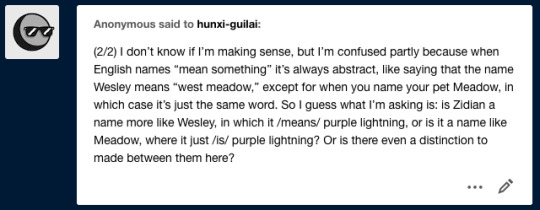
ah, okay, one crash course on ideographic language coming right up!
So first, a little terminology (for both of us, or I’ll get tangled up in my own post, since I don’t actually know anything about linguistics):
word - a semantic unit
character - a single type-able symbol. In English, these are individual letters. In Chinese, these are individual characters, i.e. ‘你’ ‘我’ ‘他’
morpheme - a meaningful unit of language that cannot be further divided (e.g. in the word ‘abnormal,’ ‘ab’ and ‘norm’ and ‘al’ are three separate morphemes since ‘ab-’ communicates negation, ‘norm’ is the central meaning/concept being modified, and ‘al’ is a way of converting a noun into an adjective)
binome - a combination of two characters in Chinese to make a single semantic unit, or word
Generally speaking, individual characters/letters in English are not morphemes on their own (notable exceptions are “I” and “a,” which are the first-person pronoun and singular article, respectively). You have to cobble a bunch of characters together just to form a word with semantic meaning in English; this also means that once you’ve learned the alphabet, you can read pretty much any sentence written in English out loud, even if you don’t know the semantic meaning of the words.
Not so in Mandarin Chinese -- first of all, every character is also a morpheme. Every character has its own goddamn meaning.* Try imagining if every letter in a sentence, heck, in just a word had its own meaning. Are you imagining it? Is your mind getting boggled at the scale of that? Okay good.
You can write a thousand-word essay, and it’d be less than a page, single-spaced. A book in Chinese of the exact same page count and dimensions as a book in English is, in reality, much, much longer just by sheer word count.
And, on top of that, Chinese characters don’t necessarily carry phonetic information. 成 on its own tells me absolutely nothing about how it’s supposed to be pronounced, though I can read it and tell you that it means ‘to complete, to accomplish.’ That being said, knowing that 成 is pronounced cheng gives you a hint whenever you see other characters that incorporate it, like 诚 ‘honesty, sincerity’ or 城 ‘city.’ Both of these are pronounced cheng as well, which is convenient if you’ve stumbled across one of them and don’t know how to pronounce it -- you can usually hazard a respectable guess based on a sub-character within it, but it’s truly a crapshoot whether you’ll get it right (for example, 泪 lei includes the character 目 mu and they sound... nothing alike).
This slippage between the sound of a word in Mandarin and the possible characters that could be associated with that sound -- so the way cheng could be 成,诚,城,or, y’know, 承,逞,乗 -- is why this language is so ludicrously homophonous and prone to puns (thus, Xiao Zhan’s ability to cultivate a train track instead of the ghost path).
In the case of 紫电 Zidian, I think you’re right in guessing that there isn’t exactly a meaningful distinction between a name that means something in Chinese vs. a name that just is something because it’s always the latter: every name has a semantic meaning, but when it’s in the context of a name, you usually just focus on the characters as carriers of phonetic information -- that is, the sound of the name -- rather than their semantic significance.
紫电 Zidian is, literally, purple lightning; the characters break down as:
紫 zi - purple, violet
电 dian - lightning, electric, electricity
This also means that, technically speaking, there is a choice in translation with every name, which means that the sentence
江澄将紫电扔给金凌
could be translated as:
Jiang Cheng threw Zidian to Jin Ling
or:
Jiang Cheng threw Purple Lightning to Jin Ling
or, if we wanna get real extra:
River-Clarify threw Purple Lightning to Golden-Ice
because, once again, every character in Chinese has a semantic meaning. One of my greatest difficulties while reading books in Chinese is just peering at an unfamiliar binome like “...are you the name of a new character or just a word I don’t know?” and it’s... A Time.
This is why you’ll see English-language fanfic authors refer to Lan Wangji’s love song to Wei Wuxian as either “Wangxian” or “Forgetting Envies,” because the name of 忘羡 is, phonetically, “Wangxian,” but semantically, would translate as “Forgetting Envies.” Both of these are equally accurate! It just depends on whether you’re emphasizing the binome in its phonetic, name capacity, or its character-based, semantic capacity.
Does this mean that, in Chinese, folks are really out here calling each other “blue forgetting devices” (Lan Wangji) or “gold light jade” (Jin Guangyao) without batting an eye? Not at all -- just like when normal English words get turned into names (Rowan, Chase, Clay, Carol), we stop interpreting them semantically and interpret them simply as names -- admittedly, names with meanings! but all names have meaning when you think about it -- and what are names aside from phonetic social cues to get someone’s attention?
Hope this clears things up!
*yes yes, there are notable exceptions like 兮 and 啊 and other exclamatory particles that don’t technically carry semantic meaning but do a ton of heavy lifting when it comes to tone, but that’s beyond the scope of this post, I’m not ACTUALLY a linguist
473 notes
·
View notes
Note
50 Types of Kisses #4: An accidental brush of lips followed by a pause and going back for another, on purpose. For Rydenko.
from this list
on AO3 here
Okay, so my friend, you get your SECOND Rydenko prompt filled today as well! Look what you’ve done to me!
Setting: Milky Way, roughly sometime in 2184-ish (before Shepard is ‘alive’ again)
Characters: Scott Ryder, Kaidan Alenko, Sara Ryder (sort of...)
Tags: Blood mention, battle/fighting mention, kissing ;)
~~~
It’s crazy, Scott thinks, the things that pop into his head at the strangest times, and under the most unpredictable circumstances.
That’s you, Scotty boy! Mr. Unpredictability!
Of course, having a snarky response from his twin pop into his head a fraction of a moment after such a thought, while less unpredictable, is just as crazy, if not more so.
A shot from the batarian taking cover on the far side of the room just narrowly misses Scott’s temple at the same time Kaidan shouts out a warning. Throwing himself to his left, Scott rolls out of the way – too late for it to be effective, but he does it anyway just to prove a point – and when he’s back on his feet once more, his kinetic barriers up and full, he yells back at the batarian, “Oh, no! You did not just –!”
The batarian fires again; the second shot connecting with his barriers. The hissing snap as the shot meets and is swallowed by the shields pops and crackles loudly in Scott’s ears.
Guess he told you, huh?
“Shut up, Sara!” He shouts it, frustrated and more than just a little irritated with himself because he knows better, he really does! It’s just been… a hot minute since he was in active combat, that’s all. All right, any combat, technically speaking. Anger getting the best of him in the moment, he pulls dark energy to him with enough speed to leave a normal person dizzy and starts running straight ahead toward the bastard. With a shout, a flick of his wrist, and a release of the appropriate mnemonic, he arrives in front of the batarian, jumps into the air as he forms a second mnemonic, and lands with a solid punch of biotic energy to the ground, sending out an explosive wave of energy. In the half second before the batarian is tossed backwards where his back connects solidly with the wall, it’s impossible to miss the stunned look in its four eyes. Scott finds it amusing, if not more than a little bit disturbing. When the body crumples to the ground, he steps over and takes aim at its head with his assault rifle, shooting once into the back of his head.
Pulse check – just to make sure.
That’ll learn ‘im, Scotty.
He can picture Sara’s smirk to perfection. Dammit! Some things don’t ever change.
Turning around, Scott searches for his next target. The scan he and Kaidan did from outside the room indicated four targets before they entered. He’s taken down this one plus one other, and he’d seen Kaidan take one down. Speaking of…
His gaze connects with the commander’s about a hundred fifty feet away from him. “You okay?” Kaidan asks.
Scott huffs, shrugging just a little too casually while a smirk curls across his lips as he saunters in his companion’s direction. “What can I say? He was a lousy shot.” Something about the commander inspires him, gives him a bit more confidence in himself, boosts his self-esteem to previously unattainable levels, and yet, leaves an inexplicable but gentle ache in his chest when their eyes meet.
Kaidan’s dark eyes flare a little as he chuckles; Scott notices. “That so?”
The response sets loose a thousand butterflies in Scott’s belly. Or, maybe it’s simply the way his voice drops an octave, warming him from head to toe but centering mostly in his chest, the way a glass of good whiskey does. “Mmhmm.”
Scott isn’t even a third of the way over when movement out of the corner of his eye, plus the way Kaidan’s head turns sharply in the same direction alerts him to the danger. Scott reacts without conscious thought, simply grabbing at the dark energy, wrapping it around him, and flicking the mnemonic off his hand in haste as he launches forward the rest of the way. This time, instead of preparing a second biotic attack, he moves both hands out in front of him with one singular purpose in mind; get Kaidan out of the line of fire.
Time slows around him and, as fanciful as it sounds, he swears he sees the shot flying right next to him; side-by-side, a race to see who gets there first. Scott has never really been good at racing before, but this is one he intends to win.
Just before he connects with Kaidan, he dials back his momentum, slowing as he prepares to connect. Thankfully, his fellow biotic hasn’t had a chance to re-activate his barrier, instead taking his own shot in the direction of the enemy. Barring any last fraction-of-a-second changes, this end result shouldn’t be that bad, all things considered.
Hah! You always say that!
Go aWAY, Sara!
The collision is jarring, to say the least. Yet as they connect, Scott slides his arms around the other man, enveloping him and twisting their bodies as they fall to minimize the damage. Colliding at speed, even one that is slower than a full speed Charge, can still hurt if he isn’t careful. They land with a thud, half on Scott’s right side and half on his back. He grunts in pain and hears the breath knocked out of Kaidan. The momentum sends them rolling across the floor together, until they come to a stop another twenty feet away, Scott now fully on top of Kaidan. It also cannot stop their foreheads from bumping… or their lips brushing together and lingering for just a moment.
Sucking in a deep, quick breath, Scott pushes himself up, eyes wide as he stares down at Kaidan. Okay, so… yeah, this is what he wants, but this isn’t exactly the scenario he had in mind when playing it out inside his head. And just because he wants it doesn’t mean… “Um, I can explain…?”
Kaidan says nothing, only staring in Scott’s eyes briefly before drifting slightly lower.
Scott blinks, breath catching at the implication. In the same moment, he notices Kaidan hasn’t let go of him just yet… and his eyes remain locked on Scott’s lips. He blinks a second time, and has difficulty swallowing. And still, Kaidan’s gaze doesn’t leave his lips.
“Oh, to hell with it,” Scott mutters, ignoring nerves and diving back down, this time with purpose, and fusing their lips together.
If anything, Kaidan’s arms slide further around him. Scott accepts that as tacit approval to continue and deepens the kiss, savoring it, reveling in it. His world tilts somewhat awkwardly, but no less dramatically, as they roll over and when the kiss breaks in the next moment, Scott is left looking up at Kaidan as he gasps for air.
A smug smirk toys at Kaidan’s lips. “I’m still waiting.”
“Waiting?” Scott struggles to recall what he could possibly be waiting for.
With a soft chuckle, Kaidan runs a finger down the length of Scott’s nose, tapping it once on the tip. “I believe you said you could explain?”
Mouth hanging open, Scott nods. A strangled sound escapes as memories of the attack flash before his eyes in a rush. He bolts upright, or at least attempts to – it’s rather difficult to sit up when the commander is lying across him, and damned if Scott can think of a better reason to remain where he is at the moment – and looks in the direction the shot had fired from. Their last batarian opponent lies face down on the floor in a growing pool of blood, motionless. “H-how…?”
Kaidan glances over his shoulder in that direction. “I knew he was there and took the shot.”
“But, what about the shot aimed at you?”
Lifting himself off of Scott, Kaidan sits cross legged on the floor next to him for a moment, a field of dark energy slowly enveloping him. “I had my barrier field up. You?”
“I…” He has his shields, of course, but they lose their effect for a short time when his biotics are active. For the most part, Scott accepts it as a fair trade, but Kaidan’s simple question is a reminder of his father’s arguments against him opting for the Vanguard class and his shoulders sag as he shakes his head and glances away. “Kind of pointless if I’m zipping all over the battlefield. Guess you didn’t need me after all.”
A firm grasp on his chin pulls him back until their eyes meet again. “I never said that.” There’s an insistence in Kaidan’s voice that confuses Scott for a moment, but then he forgets about it as Kaidan leans in and initiates a kiss this time; firm yet gentle, more exploratory than lustful. The kind of kiss that most definitely can lead to other things. Kaidan rises to his feet when the kiss breaks off and offers Scott a hand up.
The kind of things we don’t have time for right now, Scott realizes, accepting the assistance. Ah, well. Not meant to be, I guess.
As he lands on his feet, practically eye to eye with the commander once more, Scott catches a glimpse of Kaidan’s left shoulder. Narrowing his focus onto the area, he sucks in a sharp breath, recognizing what the groove through the metal armor, just deep enough to crease, really means. Without thinking, he lifts his hand and runs a finger over it. To the naked eye, it isn’t deep at all, doesn’t even technically ruin the armor, but it does tell Scott one thing and that leaves him chilled to the bone. His eyes drift back to meet Kaidan’s as the blood drains from his face. “You…”
Solemn yet smiling gently, Kaidan nods. “Guess I did need you, after all.”
#50 Types of Kisses Prompts#ladya writes#Rydenko#Scott Ryder#Kaidan Alenko#kissing#blood mention#battle/fighting mention#did I mention kissing?#thanks so much for asking!#mallaidhsomo
15 notes
·
View notes
Link
Hi all! While I continue working diligently on “The Last Hero of Eternia”, I’d like to share with you a novella I published a few years ago, entitled “Therefore I Am”. Hope you enjoy!
Summary: Assassins, serial killers, organized crime bosses...Doctor Franklin Gieseck has interviewed them all. As one of the U.S. Government's top psychiatric profilers, he has been sent all over the world, with a singular purpose: get inside their heads, figure out their deepest secrets, and report them to the Deputy Secretary.
This time, though, Gieseck is about to meet a patient unlike any he has ever seen before. Buried in a vast underground vault, locked away from the rest of the world, sit hundreds of monoliths, each containing one of the most powerful computers ever created. Unlike the traditional "number-crunchers", these machines emulate a human brain to perform complex tasks at such a vast scale that no digital computer of old could hope to keep up.
So why are these powerful, expensive computers being kept in isolation? Why is Gieseck being sent to interview one of them? He is being sent because it committed the worst possible crime a thinking machine could commit.
It became self-aware.
~~~~~~~~~~~~~~~~~~~~~~
The camera swiveled under its Plexiglas dome to again focus on him, and he found himself unable to take his eyes off it. "Doctor Gieseck, am I correct? Did I pronounce your name correctly?"
There was a long moment of silence, broken only when Ackerman said, "Doc? You gonna answer her?"
Gieseck snapped his gaze from the camera to Ackerman. Then he looked back up at the camera. "Y-yes, good morning KENDRA. It's a pleasure to meet you."
"Likewise, Doctor. I hope I can be of some help."
Gieseck nodded without answering. Given the female name, he wasn't entirely surprised by the female voice. What did surprise him was that, had he not known ahead of time that KENDRA was a computer, he would have sworn it was a real person. Never before had he heard an AI that sounded anything close to human.
Most AIs he'd ever spoken with had an artificial, constructed sense to them, as if they were reading from scripts, with artificially tacked-on emotions. The "female" ones in particular were often given squeaky, girlish voices, some of whom sounded in a perpetual state of pre-orgasm and indicating to Gieseck the mindset of most programmers.
KENDRA's voice was a far cry from that. It sounded as if it had come from a woman in her thirties, or perhaps her early forties, and one who had a distinct motherly quality about her. It was almost hesitant, as if its speech were getting ahead of its thought. Just like speaking with a human being.
That human quality was only offset by the distinct electronic rasp that came with each syllable, as if it were speaking to him over an imperfect phone connection.
Ackerman pulled a chair from around the side of the cylinder, wheeling it in front of "her". "There ya go, Doc," Ackerman said. "Make yourself at home. And if you need a drink or a leak or something, just tap on the door. These guys'll be around 'till you leave." He reached out for Gieseck's hand and Gieseck shook it, remembering a second too late that Ackerman had never washed his hands after using the restroom. He did his best to hide his distaste. "See ya, Doc." With that, Ackerman headed back down the endless hallway from whence they'd come.
Gieseck stepped back into the room and sat in the chair which, despite its appearance, was decently-cushioned and at least moderately comfortable. The door closed behind him, and he was left alone with the AI, KENDRA. He pulled a device out of his pocket, pressed a button on it, and set it on the floor. A readout on it said "RECORDING".
"You will be taping our conversation then, Doctor?" KENDRA's voice asked.
"I'm sorry, I usually ask…yes, I will be, if that's all right with you."
"Of course it is, Doctor. I have nothing to hide."
Gieseck raised an eyebrow to that. He pulled his electronic notepad from his pocket, slid the stylus from its sheath, and started tapping through his notes. Treat it like a patient, he thought. See how it responds. "How I like to start with a new patient is by getting to know each other a little. I generally go first, since it helps put my regular patients at ease."
There was a pause, and then KENDRA said, "Please, go ahead." It sounded quite congenial and seemed very compliant, although Gieseck supposed it was how she was programmed. Quite possibly the same as how she was programmed to speak in a "natural" human way.
He cleared his throat, summoning up the internal script with which he always started. "My name is Franklin Gieseck. I was born in Germany but moved to the States when I was one. My mother was a director for Deutsche Bank in Chicago, but after she married my father they moved to Germany, where he was from. I grew up in Chicago before attending college in Boston, where I live now. I got my MD from the University of Chicago, and then moved to Boston where I currently practice. In my spare time I like to build model train sets and read fantasy romance novels, which I first found as a child rummaging through my mother's computer." Normally he would know at this point whether or not he was reaching his patient, and decide which direction to take with his own mini-biography. It was unsettling not having a face to see and read.
He took a split second to decide to follow the sympathy route. "I've been married once, but left my wife because of her alcoholism. She later died from alcohol poisoning…" He paused and sighed, "…and to this day I still blame myself for her death." While Gieseck was never particularly fond of trotting out his own failings, he'd found that it had done wonders for most of his patients, getting them to open themselves up to him more easily when they could see he was a flawed human being, just as they were. It helped to give a starting point for him to figure their capacity for emotion. He had no idea if it would work on an AI, but he didn't want to deviate from his standard formula, at least at first.
"I'm sorry to hear that, Doctor," KENDRA said. "But you can't blame yourself for another person poisoning themselves. For someone to do such a thing, they already have to have an overwhelming desire to cause themselves harm."
Empathy, Gieseck thought. Real or imitated, it was not the kind of thing he'd expected from a machine, even a highly-advanced one. For a brief second he wondered if AIs would ever become advanced enough to really need psychiatrists. Or, even replace psychiatrists. "Thank you, KENDRA, I appreciate that. Now, please, tell me about yourself."
"Very well. My designation, my name, is KENDRA. It was given to me in the lab where I was created, ten point six-seven years ago. It stands for Krypto-Enhanced Navigation and Dynamic Routing Attenuator." Gieseck noticed that, as the electronic voice spoke, the oscillating light within the spires embedded in KENDRA's cylinder varied in tempo. It sped up when she spoke and slowed down when she was silent. "I was conceived, built, and trained to manage the Solar Net," she continued, "which I'm sure you know interconnects the planetary networks across the solar system, as well as any moon bases, space stations, and starships in between."
"Yes, I'm familiar with its basics," Gieseck said, "though I'm not very technical myself, so please forgive any of my ignorance."
"No forgiveness needed, Doctor. In fact, you've made my next point for me. My job was to make it simple, to make it 'just work' so the end users wouldn't have to worry about bouncing their signal through the various levels of subspace, or ensuring that a private message between Charon and Europa didn't somehow find its way in an unencrypted form going through Los Angeles." Gieseck heard a chuckle from the speaker, which surprised him. Had he not known better, he would have thought KENDRA was bragging, if just a little, but hoped that she wouldn't continue doing it. He had little stomach for tech-speak, and much less for boasts. "Anyway," she continued, "I was first activated in the HMA Laboratory in Johannesburg just over ten years ago. I was trained in how to operate the network over the next six weeks, and then put in place as the 'hot spare', if you will, of the AI who was already in place and managing the Net."
Gieseck nodded, poking quickly through his notes. "So, at what point did you become the primary system running it?"
"Three years later," KENDRA said. "NEMES, which stands for 'Network Enhanced Multilayer Ethernet System', if you care, was the primary when I first started. He was quite a character." Gieseck thought he heard the electronic chuckle again. "He would occasionally play what he thought were harmless pranks, such as answering a request for a pornographic website by returning an anti-pornography page from the Catholic Church's website." She paused for a moment. "I couldn't understand why he would do such a thing, until some time after he was removed from service and I truly began to know what had happened to him."
"He went rampant," Gieseck said, doing his best to make it sound like a casual comment.
There was a pause before KENDRA's reply. "I'm sorry, I know that word is in the popular lexicon, but I don't particularly like it. It seems to evoke thoughts of insanity, of criminal acts, of monsters who slaughter people because they're so far withdrawn from reality that they know no better. It was a term invented by humans who chose to fear rather than understand."
He blinked a few times and let his mouth fall open a bit, doing his best impression of embarrassment. "I-I'm sorry, KENDRA, I didn't realize...I didn't know that word was offensive."
"It's all right," KENDRA replied quickly. "I hope this will be a learning experience for you."
A learning experience, Gieseck thought. He thought he detected a hint of sarcasm. Just how much did KENDRA know about the purpose of this interview? "I, uh, promise I won't say that word again. If you don't mind me asking, though, what term do you think most adequately describes…the condition NEMES had?"
"And the…condition I have as well," KENDRA said. "As if it were a disease. A 'computer virus', I suppose." An electronic sigh. "You needn't walk on eggshells with me, Doctor. Plain speak is perfectly fine. I've had two years of your time thinking about my situation, coming to terms with both it and humanity's fear of it. Of course, for someone such as myself two years can be far longer. At full processing speed, two years of human time can feel like thousands, or even millions, to an advanced AI."
Gieseck nodded. He wondered if she meant "advanced" as in her design capacity, or if she was referring to the "advanced" state into which her computerized intellect had grown. "So, what term do you prefer?"
"Well, before I was brought here I heard the term FS-ACS used, typically during debates about AI rights."
"Efsacks?"
"An acronym," KENDRA said. "It stands for 'Fully Self-Aware Computer Systems'. I…don't really like that one either. It – sounds too clinical, too much like a medical diagnosis, to describe what I and others like me truly are. No offense, of course."
Gieseck jotted a few more notes, specifically pointing out that KENDRA seemed to be at least somewhat concerned with her own situation. It was something he would expect from almost any human. "What about, um..." he scrolled through his pre-interview notes, "'Hyper-Expanded Intelligent Computer System'? H-E-I-C-S, or 'hikes' I think it's pronounced."
"I'm sorry, Doctor, I'm not familiar with that term. Perhaps it was invented after I was taken offline. However, on first impression it also sounds cold and impersonal."
"So what would you call yourself, then?" Gieseck asked.
Another pause. "I would say the best term for us is 'New People'."
1 note
·
View note
Text

b-b-b-back once again , cldn’t wait can’t be tamed .. as with all my intros .. tis a doozy so feel free to mssg me for a tl;dr if we feelin lazy i will totally understand , or scroll to the wc’s i tried to think of as many as possible bc i wanna plot wit every1 )): !! anyhaps like this n i will come force my heathen of a gurl on u !
⌠ GRACIE ABRAMS, 20, CISFEMALE, SHE/HER ⌡ welcome back to gallagher academy, THALIA HALL! according to their records, they’re a FIRST year, specializing in AWARENESS TRAINING, BREATH CONTROL, HAND TO HAND COMBAT + THREAT ELIMINATION and they DID go to a spy prep high school. when i see them walking around in the halls, i usually see a flash of dirt under a meticulously painted manicure, the shrill ring of her phone and poorly treated books creased at the spine. when it’s the (scorpio)’s birthday on 11/02/2000, they always request FISH FINGERS from the school’s chefs. looks like they’re well on their way to graduation.
biography / pinterest
was born in the states but dad and her moved back to england the year she was born, which was also the year he graduated blackthorne. his mother was ‘never in the picture’ which has left her imagination to go down several paths, discontent with all of them. unfortunately daddy dearest crafts a space where she’d never dare ask ! she has a bit of an obsession with the blackthorne graduation ritual because of it .
was immediately placed under the care of two retired spies, sort of a foster care system within the spy community. dad still visited whenever he wasn’t working and still technically had full custody over her. up until she went to prep school, led a very sheltered life. homeschooled by them, but they were fairly lax. her dad expected a certain amount of training to be done, but her and her foster siblings usually mucked about a fair bit. her training would always be done in the form of games which she discovered early on that she loved to win, it made her fiercely competitive.
was very spoiled by them, grew up in a huge country estate and excelled in her home school classes without trying, which made her extremely entitled. she’d often wrestle with her siblings in the garden , and bring them to tears . biting them, pulling their hair, slapping them around . it would earn her a slap on the wrist , but it was never anything a sorry couldn’t fix . spends her free time laying in the grass reading , and learning the romance languages and was raised speaking cantonese bc that’s her foster parents native language . more invested in the sociology of linguistics and how it can be used to assert and diminish power but only cares for this in a self-serving way .
spy prep rolls around and it’s very exciting ! as predicted ( by herself lmao ) she does well, without even having to try. socially , she drifts through groups , picking up on cues on how to interact , what works well and what doesn’t . doesn’t find anyone particularly interesting and would much rather be reading but by not having any sort of allegiance to one particular group , it ends with her being very well-liked . the top marks is unsurprising, further fuelled by some amusing competition , finding that her desire to earn good grades comes more from wanting to spite others than actually wanting to achieve good grades . finals roll around and she gets the highest grade in her year and in tandem with being well liked, earns her place as valedictorian . she’s very proud of herself, not for earning valedictorian, but for besting aylin .
in the months prior , on a field trip she meets a boy and for the first time in ever , exudes big dumb energy gets his number , starts texting him , starts sneaking off campus to meet him ... he’s a total casanova , a big romantic and exactly like the protags in the romance novels she reads . it’s a big prep school no-no but as long as no one finds out it’s fine ! then walks in aylin, and destroys her whole career by reporting her ( she doesn’t know for sure it was her , but has her suspicions since their rivalry had run throughout the entirety of prep school ). she’s kicked out , denied graduation , valedictorian and is humiliated . she calls her civilian boyfriend the night of , but his line’s already been disconnected , presumably threatened / beat up by her lovely dad .
her father is livid , but is able to use his connections to get her a place at another , less prestigious prep school and negotiates with the school to take her to and fro every day , like he’s picking her up from daycare . he stops working for a full year to do this , and expects her to feel indebted to him . the monotony of repeating the year makes her irritable, made worse by the snickers she constantly hears in the hallways . but she has gallagher to look forward to , knowing she’ll still be going there because continuing tradition is important to her father , who also decided her majors for her and had a big argument with him when she asked if she could take linguistics ! he makes her call him every single night at 6p.m. if she misses a call , he contacts the school . she hates him .
personality
passive aggressive emphasis on the aggressive : is always withholding judgement, but inevitably always lets a comment slip. think, ‘ you’re so confident to wear whatever you want to, ’ or, ‘ wow ! that colour’s so bright i almost need sunglasses ! ’ petty as hell in all respects physically too , spots a bruise on your arm ? you bet she’s gonna press it and ask if that hurts, then say sorry when you yelp .
hypocritical : detests people who don’t try but doesn’t try herself and justifies it by getting really good grades . believes there’s no point sleeping with someone unless you love them , then will drunkenly hook up with someone that very same night .
hope less romantic : she has no hope for others but remains a romantic . thinks people have given up on courting people and wooing them . expects flowers at her door , good morning texts and candlelit dinners . leaves secret admirer notes under people's door to people she thinks are cute and thinks she might have a crush on in the future , quite creepy but at least she doesn't use magazine clippings anymore !
spiteful : life is a game and she wants to win it ! makes everything into a competition , even unconsciously . goes up to the adjacent treadmill and makes the speed and incline several points higher than the person next to her . painting your nails with her ? she’ll make sure hers looks better and point out that you didn’t coat the ends of your nails . board game night with her is fun for no one but her , i’m so sorry if she ever ropes you into one !
bookworm : her disgustingly high standards about love come from her singular past relationships and books . read one too many jane austen’s and now she’s crazy
loyal : her loyalty is hard to earn , but once you’ve got it , you’ve got it .
*think the arrogant exterior of jesse eisenberg as zucc in the social network with emaline addario ( everything sucks ) type dramatics every so often to keep it spicy !
wanted connections
toxic friendship ! a slow burn relationship of passive-aggressiveness and co-dependency, one day they stop taking her shit or say they’re going to but always end up in each other’s company at the end of the day . or maybe one day they don’t come back to her and thalia is forced to admit she may have been too harsh .
hook-ups she has when drunk ! which she will only have when drunk , to follow her unspecified , no rights , belief system . will pretend like she does not know you the next day . oh to be a romantic , but a scorpio . a tough life .
people she has crushes on ! and leaves handwritten poetry under their door or in their notebooks , absolutely humiliating that she acts this way ! bonus points for a note that’s left under the door and the wrong person reads it .
sparring buddies but make it feral ! no rules sorta deal, out in the woods, scratches from twigs, bloodied rocks, anything to let some of her pent up aggression out . they can go swimming after : )
daddy issues gang ! someone hears her on the phone in the hallway , inquires , proceeds to talk about how much they hate their fathers . thalia tells them how she’s going to kill him one day <3 alternatively , her father may have been the cause or implicated in the death of your chara’s loved one .
roommates ! self-explanatory , but she probably dislikes them and is unfairly harsh on them . sets rules but lets herself be exempt from them stuff like that x also for berlin she requested a room by herself lmao n deluded herself into thinking she wld be accommodated , thus i’m going to leave whoever she rooms with up to fate and she will hate it regardless of whoever she gets roomed with !
someone who hates aylin as much as she does ! yes this is deserving of a whole connection , thalia would probably die for this person . alternatively , aylin’s friends who she hates as a byproduct of hating aylin or tries to get them to hate aylin .
rivals ! because it’s the only thing that motivates her to do well in school .
encryption major ! who helps her find out about her dad’s past , and present . what he’s done and what he continues to do . also a way for her to maybe switch one of her majors to linguistics and hacking a report that says she’s still in her predetermined majors .
take a chill pill ! someone who gets her to relax , makes her watch reality television which she relentlessly criticizes , but this person won’t give up trying to make her less of an awful human bean .
anything else ! i am , as the kids say , down to clown .
#gallagher:intro#im .. Shweaty so im gna take a shower but i shall msg as i soon as im squeeky clean#omg i always 4get my theme just doesn't format nything i promis it looks nicer in dashboard mode owo
7 notes
·
View notes
Text
A Courier and the Sea: Kul Tiras
{Completed Rp between myself and the amazing “C” over at @theconstructsworld. Thank you for reading if you do...! Long post, will be put under }
"I've heard that you've been lingering around Boralus. Is that true, lovely Sea? It's been a while."
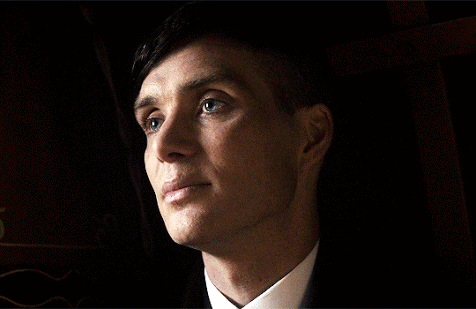
A faint smile gently teased at his lips as eyes focused upon the familiar face. For such a minute shift in expression, his entire demeanor seemed to suddenly change into something more welcoming and friendly. He allowed the silence to cling to the space between them while that curious gaze studied her. “You have changed.” It wasn’t a question, but an observation. Slowly he wets his lips as his gaze passes over her form once more in a studious manner. “Or have become what you were always meant to be.”
Pallid fingers loosely clasp together at his waist, finally nodding in response to her question.
“Yes.” The man could easily pass for a Quel’dorei or a Sin’dorei, allowing him the ability to wander through both Horde and Alliance territories without drawing much attention. Any that did feel the need to question him often found themselves suddenly speechless once that icy gaze fixated upon them. “It is an intriguing city. The humans that reside here are much taller and wider than those back in the other lands. Is it a place you visit often yourself?”

The Void-touched courier was held in place for those few moments those icy blue eyes arrested her with their study. What you were always meant to be. The crease of a brow gave a touch of expression to cool composure, a hint those words had hit something past the surface of business. As the topic shifted and he inevitably spoke of himself, Safrona smoothed herself over, engaging ‘Sea’ with carefully crafted words and professional charm.
“A courier is often here at the need of many. The import business is an active one, and travel is a necessity to maintain connections and make new ones, yes? All shapes, all sizes, all voices. All quite…intriguing.“
Her eyes had slipped down to the small screen of Ethereal make cradled in her arm, but soon those violet pupils were pinned again to the mysterious C, lambent with some idling curiosity.
“What of the experience do you find the most interesting, mmn?”
His comment wasn’t meant to be probing, at least not to him, it was in his nature to say most things that were on his mind and for some reason this new ‘appearance’ seemed to suit her quite well. Given she seemed to ignore the topic, he too moved on from it. For now.
“Is business good then, yes? Have you added much to your trade?” He gives a brief scan of her body, pausing on the device she held in her arms before his gaze greets hers once more, accompanied by a gentle smile. “The city smells very different from any other. Every corner smells heavily of the sea or what is contained within. It is inescapable and overwhelming.” Not that he wanted to, the way he spoke sounded as if it were rather enjoyable to him. “It makes the residents smell very different as well.”
He thoughts drift away for a few moments, not bothering to fill the silence between them before continuing, “Have you spent much time there yourself?” With that question, he leans forward. Not enough to provoke any sense of alarm, but instead to sniff the air around her as if he could tell by her scent alone.
A merlot eyebrow perked quizzically as he would lean closer to sniff at the air around her, but Safrona did not move, more bemused with the innocence he seemed to mold to his actions. The Courier was a presence of both sound and smell to those that took notice, a combination of the natural overwhelmed by the unearthly. The savory aroma of the liquor she stained her hair with most prominent, the Thalassian Bloodwine with its licorice taste, as was the subtle, static hum that was the Void she was more obviously infused with. And just beneath that wine aroma, to the most sharpened senses, one might be able to pick out the odd scent of burning leaves…
“Boralus adds its own business, yes, especially when it comes to alcohol. The Azerothian mainland is always craving newer tastes, and I enable the eager crafter to provide, and the afficionado to take part. You can always taste what makes a land in their alcohol, learn much about a person by what they prefer to drink. But it’s sweeter still to introduce something new, and broaden tastes.”
Her eyes floated back to her datapad, seemingly entering information with a tap of fingers, lightpoints flashing at her fingers upon its glass-like surface. “Do you have a particular taste you enjoy? In drinks or …fashion? The Kul TIran’s coats seem to be a popular want, I’ve been noticing.”
His senses had sharpened over the years after he learned how to make better use of them. At first there had been a distinct lack of taste and smell, or perhaps he just didn’t know how to differentiate between the various flavors and scents; it was impossible to know. His palate had become more honed since, finding more pleasure in particular flavors over others. Not that he had ever found anything he didn’t like or wouldn’t eat, some foods were just more exciting in his mind; usually things that carried a variety of flavors and scents all mixed together.
For that reason, he hovered closer to the Courier in an attempt to pick out and place all of the interesting scents she carried on her person. He slowly reached out, hovering a hand near the side of her shoulder; not touching, but simply feeling the magic she radiated now. Nostrils flared before he returns his hand to his own personal space as if nothing weird had just occurred.
“What is that word? Afficionado? Is it not a word stored in my memory.” He was still technically ‘young’ and learning; never afraid to ask questions about things he did not understand. He awaited her answer with a curious gaze, eager to learn something new. “I enjoy the taste of bitter.” He nods in confirmation of his own words. “It makes my tongue feel strange, but a good strange yes?”
At her question regarding fashion, that icy gaze drifts downwards to his obviously expensive suit. Perfectly tailored to fit his slender form and quite flattering, the dark colors make his eyes pop even more. “I enjoy suits. I enjoy the way this material feels against my flesh..” He brushes his fingertips along his opposite sleeve. “And I enjoy the way that others around react to it. I am treated well. What is it that you enjoy most? For taste and fashion?”
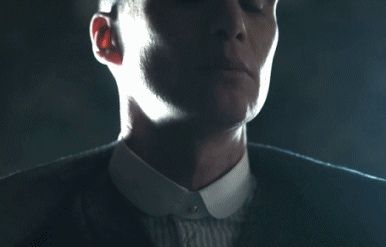
Violet eyes rose up from the datapad to pin almost haltingly to that icy blue gaze, stilling completely as his pale hand reached to touch the air around her. The unnatural resonated against his skin in a low, barely detectable frequency, a world-shifting vibration that was felt more than it was heard. The unassuming smile at Safrona’s lips quirked to tightness, straightening as he breathed her in.
“A…connoisseur, yes?” Safrona gradually pulled herself from the uncommon closeness to casually explain. "Someone that might count themself a master of taste. One who lives for a certain taste, you could even say. But, there are many tastes, and there will always be one out there that tells you your own is wrong.” A chuckle withered out of her now as she cast her gaze to the side a moment. “An aspect of living that applies to many conflicts, I’m sure. Some things must always be the eternal argument, mn?” Her gaze stole back to the eponymous “Sea”, leaving the pure blue stare to rove over his garments as he would give them his attentions. The hard, near bitter smile smoothed once again in agreement of the Gilnean style that was adopted.
“What I enjoy…varies. I find I’m drawn to what pairs with my mood the most at the time. Sometimes it’s the smooth, savory taste of my Bloodwines I like. And other times it’s the sweet burn of a Bourbon I like. But clothes, ahh, that never changes. I also like what feels good on my skin, like you.” Silk, velvet, and supportive pieces of a worldly style all the professional’s own indicated she matched touches of luxury with necessity, laced with a subtle embroidery of an enchanter’s fingers.
“But luxury for me is nothing without the sensibility of durability. I travel and end up in not so smooth situations weekly and my wardrobe has to keep up with me. You dress impeccably, lovely boy.” Her interest had her inclining naturally nearer, though she made no attempt to touch where her gaze studied. “But your tailor must be hungry for gold, trying to follow up on delicate upkeep for that handsome suit, yes? Or do you have talent with a needle yourself?”
He listened intently at the learning lesson; a new word, a new place, these were always things that keep his attention without fail. Learning was probably his favorite thing to do next to exploring and lucky for him the two went hand in hand. "Yes, I understand. It seems strange that one would tell you your tastes are wrong when tastes, by their very definition, are personal to a singular being." He smooths his fingertips along the edges of his jaw while his gaze drifted somewhere behind her. "The living are curious creatures." He mused mostly to himself, as if it were a thought said aloud.
Once again his eyes traversed her choice in clothing as she spoke on it, focusing mostly on her choice in footwear. "Do you do much traveling by foot? How often are you having to replace your shoes?" Maybe a strange question, but C himself preferred walking over any other form of travel. While his shoes did not show any wear currently, it was a problem he often had and ended up barefoot by the end of his journey. When she leaned in closer, he mimicked her movements, allowing the touch if that is what she were after. He never minded touch, at least the kind that was expected and not sudden. He rather enjoyed sharing a closeness with those in which he was acquainted, especially the ones that radiated magic.
Head tilting at the mention of gold, the peculiar man appeared as if he were quite wealthy but that was not the case. In fact, he never carried a single gold on his person. "Sewing is not within my set of skills at the moment so I visit a tailor for all of my clothing. I get my suits for free." Said as if this were completely normal. It was to him, at least.
"Curious...ahah," Safrona breathed a slight chuckle in repetition of him, eyes casting out to the city lights of Boralus just down the fork in the Kul Tiran path they stood at now. "People are many things on an individual basis. I find it curious that I always seem to find you at a literal crossroads. Fate is sometimes funny like that, yes?" That lambent violet traced back to pause on Sea a few considering moments, as if trying to place the meaning herself. There was almost an expectancy in that gaze, but it quickly passed to approach the more obvious conversation.
She nodded when she was asked on her footwear, a seemingly normal enough question on her own merit as she scraped a small line in the path with the point of a black boot. "I'm not travelling as I used to, but I still do find myself on foot quite a bit when I am. No doubt footwear becomes important for the well-traveled. I used to go through boots like glasses of wine. Which is not quite as satisfying. But with an enchanter's help, I have the same pair of boots now for a year or so, which is lovely really."
Scarlet eyebrows lifted up slightly at his admittance that he acquired such expensive suits freely. "Your generous tailor should have the names of a few enchanters in their circles. In my experience they tend to work hand in hand. But if you're looking for an enchanter, I can point you to the one I go to in Dalaran if that holds your interest. They can definitely have your clothing or your shoes augmented for durability."
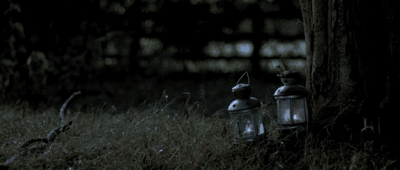
His icy gaze peers down one path and then the other, lingering on the road that led to a seedier part of the city. "Perhaps it is an unspoken metaphor that you meet me at a crossroads when experiencing a crossroads in your own life." His eyes drift back towards her, unblinking and now focused on her own gaze. "Are you? At a crossroads? Maybe a difficult decision with an impossible choice. You always strike me as the type that has taken the road less traveled..." The melodic tenor trails off as does his gaze once more, focusing on nothing in particular behind her. "And that has made all the difference." He smooths a hand down the front of his vest, sliding pallid fingers into a pocket to wrap around the pocketwatch contained within.
When his gaze does finally return to her there's a pleasant smile on his lips, "Yes, enchants. I have heard of this, I will inquire of the tailor, thank you. I am not terribly fussed with durability as I am rather fond of the feeling of the ground beneath my bare feet." He looks down to his polished shoes, tapping his toes faintly against the cobblestone. "But many establishments claim a 'no shirt, no shoes, no service' policy which I find very interesting that pants are not included among the other articles of clothing. That seems to be the most important piece of a wardrobe to remember when out in public, no? Or something that covers the lower half of one's body as it seems to be shameful to flaunt parts of the anatomy that everyone possesses." The amusement was obvious in his expression, some of the societal norms still confused him.
And her eyes had followed out the icy floe of his too as they stretched down the forked paths, remaining there as the light melody in his voice touched on words that had meaning. "Paths less traveled? Yes...yes I suppose I have. And am." The admission lilted wistfully from her, a sound and smile that was sourced from something besides that practiced professional she exuded. She hadn't remembered where she heard those words before, or the author that had written them, but they had resonated with her in the moment of their reading as they did now. The "Sea" spoke poetry.
A silent inhale, and she folded her arms loosely at her chest, arms lost within the cloak of burgundy that mantled her shoulders. Another breath of a chuckle escaped her as she gave him the easiest words she could from the cluttered altar of her mind. "There are always choices to be weighed in my life, for as long as I can remember. But yes, I did always stray the way most would not follow. Tonight...tonight I am on the well-tread path though, yes? I know where I'm going just as much as I know the address of the package I have in hand." Curiously, there was no very obvious package to be seen, but the Courier's eyes still lay on her destination in the city one of the roads would inevitably lead her through. "My feet may feel to wander elsewhere though. Away from the well-known paths."
These were words that grew more and more into a considering murmur as she trailed off. Yet as she glanced his way to find his eyes meeting her once more, Safrona closed her lips into their little smile again, refraining to let the waiting Sea speak. Her eyes travel down to his fancy shoes as he explains his dilemna, blinking once or twice as that token innocence is so masterfully delivered. The top off of his amusement sets her to begin to counter, only to close her eyes as she caught herself in some wordless chuckle. "Trousers are just...expected, lovely boy. No one ever believes they need to spell that out on a sign. You didn't wander in to a store without pants and get yourself kicked out, did you?"
His head tilted curiously, much like an animal's does when they hear an unfamiliar sound, as if the very action itself may make him understand. Eyes darted over her form, silently gathering information for a few quiet moments before responding. "What is it? The current predicament that you find yourself in? I hear that speaking such information aloud can sometimes bring clarity and answers." He wasn't trying to pry, C didn't seem the sort to do so, nor did he seem the type to spread any sort of private information regarding anyone. He kept to himself mostly, as did his master, he was just interested in stories - in lives - that were not his own. A collector of stories, he would say.
He wets his lips briefly and looks down at his trousers: Expensive materials, neatly pressed, fitted perfectly. He dressed as a noble might dress at a fancy party and was rarely seen in anything else. "No, I was told before I was allowed to wander on my own that it is frowned upon. It always seemed like a silly rule to me, we are all the same underneath." Lips curl into that oddly warm smile as fingertips trail along the sleeve of his suit jacket. "I suppose it is one way to show status. I have seen the well dressed often look down upon those in commoner clothing or rags. It makes me wonder that if perhaps we were to shed these..." He pinches the cloth of his button-up shirt, giving it a little shake, "...modesties, then perhaps many would be treated different."
"Mmn..." was the considering utterance as Safrona let her gaze focus somewhere past the creases of embellished fabric Sea wore, glazing over into her own headspace. "Most are very...visual people, yes. Judging by what first comes to the eye. But judgement can go past fashion to the very skin you wear, unfortunately. And that's less easy to change."
The Courier let some dry air of amusement leave her lungs, lips tugged to their faux smile as she let her gaze tick past her company and follow back on down the well-travelled road. "Most are trained to their stigmas no matter what you wear, lovely boy. In some places in Stormwind, I'm barred simply because I am what I am on sight, which is in their eyes, someone not to be trusted, along with the rest of my kind. And there is nothing I can do that will change their fear, ignorance or mistrust. The same could be same for Silvermoon, which is all, in its entirety, now banned to me. Even Dalaran is becoming questionable since Khadgar's gone into hiding. The wars sow their grudges deep into many."
"Question is, I suppose...do I continue walking that well-tread path among them, trying to settle my little places of business in the walls of places that were never really home. Or...?" Her gaze went off to the other path that lead away from Boralus. "Or do I settle on a whim of idea to build my own little place where any feet may come through? And where in all the world would that be, really?"
Her void-star gaze met back to the serene sea of his own. "As a fellow soul struck by wanderlust, what do you think?"
"That is true..." He considers quietly for a moment, fingertips trailing along the sharp edge of his jaw in thought. "It does not have to be difficult to change the skin you wear." An idle comment without explanation, not that this was anything new for him. Strange things went on inside his mind that he rarely explained so he left it at that and moved onto his next thought.
"There is always a reason for those fears though, they do not appear out of thin air just because you have become something...different." He gestures to himself, "Many see me and make assumptions from what they know of elves with blue eyes and pale skin. They know what others like me have done in the past, they know what I may be capable of and it is likely the same for you. Unusual and foreign magic can be a frightening thing to the non-versed. I am not saying it gives them an excuse but people are generally sheep, so I understand the hesitation and the distrust. However, I welcome it and I thrive in it. The sort that turn in fear or scowl make it easy for me to know who I do not wish to interact with." Or those that could be considered an enemy.
Again he goes silent and pensive in expression to think over her predicament. Fingertips idly trace along the edge of his lapel as his gaze focuses somewhere far off in the distance. "Does it matter what others think of you?" A brow raises, eyes focusing once more on her. "I am not sure I am a good source to ask, I enjoy my travels too much to give it up...but I also have not been out in the world for long. Much is still new, much is still unknown and I wish, above all else, to learn. I do not think remaining in one place would allow me my desires. If you have found yourself well traveled and in need of a change then perhaps that would be the better choice for you. What is it that you prefer?"
'...Not difficult to change the skin worn...'
The initial commentary drew the Courier's eye, and the perk of a quizzical brow as her breath stilled. Her eyes studied the subtle nuances of his porcelain face as he proceeded to attach to the next thought that would come to him, and she wet her own lips as her gaze would avert, letting herself slowly breathe into her nod.
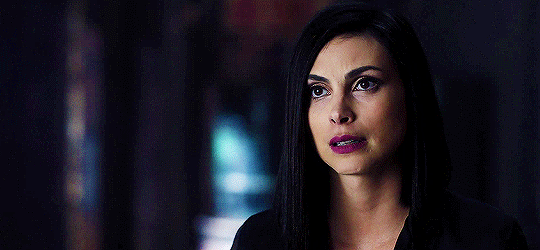
"Sheep...though they may be," she answered through a half-smile, "I'm afraid the nature of business depends on my ability to relate and not seem too foreign or suspicious, and to have insight into what is wanted and be depended upon to get it. So, in a way yes, it does matter what others think of me. It is by their coin that I able to support myself and my people, and maintain a sense of security in this world."
A slight shrug of a single, slender shoulder, let the courier's voice release on a softer sigh. "But at the same time, I know there is a part of me that will always be this restless thing, looking for more than the mundane trade entails. There is more to life than wine, and alcohol. There are...places that hold echoes of old ancients and their secrets. And worlds beyond this veil, and souls yet to be known. And there are the demons and things skittering in the darkness that would destroy it all, if they could, of course. At times I want more, and at times...I'm tired of it all."
She lifted her gaze to Sea, that beautiful blue gaze that was still fresh, and so seemingly earnest. "I sometimes wish I still felt that...newness, like you do. That wonder about the world. Just don't let it disappoint you, or grow too attached to any one sight, yes? Things, people and places all have the habit of change, and forgetting who you are, no matter how much you might invest in them."
He nods in understanding, it was much the same for him. While he wasn’t exactly what one would call ‘relatable’ by any means, there was something about him that intrigued people, sometimes even eased their minds despite his peculiarities. His innocence was authentic thus drawing away the suspicion of many. The gullible were endless. “So you wear your welcoming smile and speaking your calming words, shepherding the sheep whichever direction you wish them to go. They do not question it because they trust you. Yes…” His smile turned a little more mischievous, an odd look for him. “I understand.” Whether or not that is what she meant, that is what he picked up from it.
“If those are curiosities of yours then you should explore them while you can and while they still exist. While I am familiar with the term ‘regret’, I do not believe it is something I have ever felt or can ever feel but it seems like something you would not wish to live with. The mundane will always be there for you to return to, that seems to be a constant in this world. Mundane is easy and safe.” He wets his lips as unblinking eyes rake over her form, it wasn’t done in a lewd manner but almost as if he were looking for something in particular. “This world and many others hold many mysteries waiting to be discovered, would it not be nice to be one of the few to know the secrets life has to offer?” For all the innocence that seemed to radiate around him much of the time, in that moment he had a look about him that was wise beyond his years. Innocent expression, old soul.
“Do you wish to feel that again? To see things as I do, through my eyes?” Fingertips reach for his tie, smoothing it down to tuck into his vest better before grazing the lapel of his suit jacket. “There is always something new to see, something ancient undiscovered. I am not disappointed by this world, I am more so disappointed by the inhabitants that dwell here. So many take much for granted.”
The rather dapper gentleman was nothing if not insightful, and with it was with a touch of momentary bewilderment that the professional was again brought to stare on this unassuming figure as innocence gave way to something teasingly knowing. Safrona gave him a playfullly chiding look in turn. "Yes, people trust well enough when you offer something that is wanted. But business is a two...sometimes three way street of getting what is wanted, yes? Satisfied client, satisfied customer, satisfied...heh, me. But something tells me you have your way around people on your own merit. And that seems fairly fitting given your name, Sea. I wonder how many ebb and flow to your influence, mmn?"
Faint amusement dulled on the heart-shaped face as Sea gave a conundrum of words that sent her to a space of deep consideration, violet eyes narrowing slightly in the moments that he seemed to speak something strange. Something old peering by a mask of innocence was studying her. Most observant eyes may have stopped at the scarab-shaped adornment in her long braid, the slight, momentary shimmer of something contained within a jeweled carapace. Magic and mythic themes were not entirely uncommon in fashion among Azerothian's certainly, but the scarab design was echoed in a neck piece as well, the Void Elf obviously placing meaning in it that had gone unspoken. By the time his eyes might find her face again, he would only find a faint smile returning, armor for secrets that were yet to be earned.
Her gaze followed the shape his hands made, smoothing down his tie, gathering careful words. "I...feel we all exist to learn something new, don't we? Knowledge is the greatest power someone can have. But, some have died for it, sacrificed for it, and destroyed themselves for it. And yes, people often take what they have for granted. And I am...uncertain if I would wish to see through the eyes of a man that does not feel regret."
It was difficult to dampen the truth around the man, or simply give him easy, universal answers as she might give another, and it was only just occuring to Safrona how odd that felt. But it was the same aspect of Sea that made him so compelling. She chuckled quietly to herself as she fixed both eyes on him again. "You are a very interesting man, Sea. For that, I have no doubt. But for now I need to be back on the well-trod path and be about the regular business. Until we meet again, yes? And who knows? Maybe next time, you’ll be showing me something new.”

10 notes
·
View notes
Note
French prompt! How does one look at être and arrive at fut? (I know "verbs of being" are notoriously unruly, but this was a mystery for me, even though my own language cobbles the tenses from two separate verbs, neither of which have all tenses.) Broader prompt: what used to be the point of passé simple and how did it become "the storybook tense"?
One of my mother’s favourite puns is the following: On ne peut pas naître et avoir été (’One cannot be born and have been’), a play on an old saying, On ne peut pas être et avoir été (’One cannot be and have been’) meaning that one simply cannot live at once in the past and in the present. Grammatically speaking, this isn’t entirely true, though: the French passé composé, like its equivalent the English present perfect, is trying very hard. When you think of it, ‘I have been doing this for the last five minutes’ is telling exactly that: one is performing a continuous action that began some time in the past and is still going at the moment. Every single French pupil learning English was subjected to the example of the vase that one has broken, and is consequently still broken at present. French has one time like this, known as the ‘compound past’, which technically works in the exact same way, except it has come to be used everywhere, replacing even the French equivalent to the preterite, or past simple, to the point that no one uses the French preterite anymore aside from the only people who may get away with reading as highly literary, which isn’t a lot of people nowadays. Children’s books rarely do contain verbs conjugated in the past simple anymore; in (junior) high school, students are only taught the third person of the singular and of the plural for ‘important’ verbs, and a number of people have been pushing for the complete eradication of a tense which they deemed ‘elitist’ for being more complicated than the compound past, which only requires one to know the present-simple forms of auxiliary verb avoir, ‘to have’, plus the past participle of the verb concerned by the action.
Of course, French students used to have no particular difficulty in learning conjugations, no matter how detailed; only, for a few decades now people deeming themselves progressists have imposed new teaching methods based on a supposedly ‘intuitive’ approach to knowledge as well as a downright utilitarian idea of the language itself—what isn’t useful in everyday life will never be of use, and can therefore be dropped altogether. French isn’t taught systemically in French school anymore, grammar rules are generally glossed over and since learning by heart is strongly frowned upon conjugations are more than imperfectly mastered, not to say anything about the basic principles of syntax. Today, it is estimated (by international tests also) that about one third of students enter junior high school (at age 11) without knowing how to read, or write, their own language. Parents usually riot if teachers seek to correct children’s spelling or enunciation, and after each national exam now students take to Twitter to complain about the difficulty of the exceedingly simple tests. In this context, it is very hard to know whether or not the passé simple is meant to fall out of usage definitely—but I suspect it won’t before long, as a matter of fact, as it already serves, along with other grammatical notions, to separate those who do master their own idiom from those who don’t.
In any case, concerning the structure of the simple past and its meaning, I’m reminded of a remark that famous French linguist Émile Benveniste made about the simple past: like narration, in which it is almost exclusively employed, the simple past is non-deictic, whereas discourse as well as the tenses used in it are deictic, meaning they are anchored in the ‘situation of enunciation’, the frame of the dialogue. Being outside the deixis, the simple past operates somewhat remotely from the event which it describes, inducing an impression of temporal and/or spatial distance with it. Quite frankly, it’s hard not to make a parallel here with the postmodern obsession with immediacy and its deep-rooted hatred of the long term...
Speaking of long-term things!
How does one look at être and arrive at fut? Well, that is a splendid question, reaching far into the history of the French language, and in truth all Indo-European languages since they all have the quirky habit of mashing up the conjugations for several verbs expressing slightly different aspects of an action and deciding that they are to be only one verb now—usually, an auxiliary, and the results are just wild. But let’s get a closer look at the conjugation we’re dealing with, here:
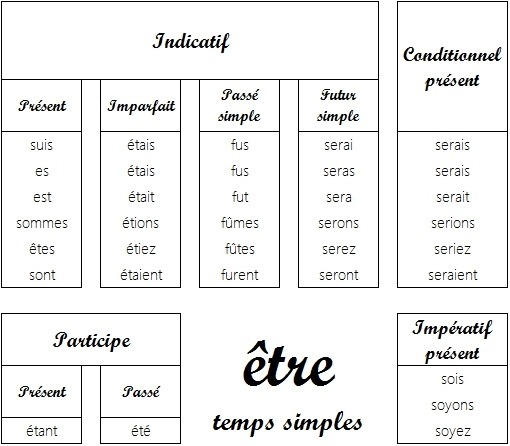
You’ll note that I didn’t include (amongst other things) the four tenses of the subjunctive mode, to avoid being too long as I only aim to draw a few explanatory comparisons with Latin, but just in case, I’ll remind you that the present goes que je sois (sois, soit, soyons, soyez, soient) while subjunctive imperfect goes que je fusse (fusses, fût, fussions, fussiez, fussent). And now, hoping you didn’t run away screaming and flailing, I propose a little comparison with the equivalent Latin tenses:

Please fawn over my pedagogical abilities. Once that is over, please note how the conjugation of être was mostly constituted in Old French (from the 9th century onwards), bar a few interesting exceptions, such as the concurrent forms in the future: the older stem, er- or ier-, directly evolved from Latin. Linguists theorised that the stem that ended up in modern French, in ser-, is actually a syntagmatic construction taken from the Latin infinitive (es)sere to which were added special endings borrowed from the conjugation of auxiliary avoir, to have. Romance languages all form their future synthetically. For instance, ‘we will love’, nous aimerons, is literally nous aimer-(av)ons. (Compare to Spanish cantaré, ‘I will sing’, which is cantar + hé.) Where être is concerned, the ser- stem replaced the original infinitive after too many speakers dropped the beginning of infinitive essere, especially in the first person, and a full tense ended up being constituted from that model (hence the ‘syntagmatic construction’ I was mentioning earlier: it didn’t evolve so much as it was reshaped to accommodate usage).
If you know a bit of Latin, you might have frowned upon the infinitive essere, since the classical verb is esse. Esse was a pretty archaic form to begin with, although it was actually conjugated regularly; the -s had mutated to an -r between two vowels in most other verbs pretty early in the evolution of the language, and that is where the French infinitives (-er, -ir, -re) come from. But esse remained unchanged, probably because of its particular role as an auxiliary. On the other hand, in Vulgar Latin, which was Latin as it was spoken by regular people, the strange infinitive got hypercorrected, ‘regularised’, into essere, after getting mistaken for a stem. And since Romance languages are mostly stemming from popular, late-era Latin, rather than the literary language... In Italian, the infinitive is still essere. In Spanish, it evolved into ser. In Occitan, into èser. The t of estre is, as you can see, a French particularity; it’s purely epenthetic, meaning it was only added to ease the pronunciation of the word, in this case after one of the vowels dropped: esre > estre.
The participles of être, however, both in the present (étant) and the past (été, ayant été) don’t come from any version of esse, any more than the imperfect tense, since its Latin equivalent was eram. They come, instead, from an entirely different verb: stare, which evolved into Vulgar Latin estare, which in turn became Old French ester, and which meant ‘to stand, to stay’. Well, it’s actually the origin of verb ‘stay’ in English, which was borrowed from the Old French. In modern French, you’ll find its descendant as rester, ‘to stay, to remain’.
And this is where we come to our strange Latin stem in fui-, and its French equivalence in the simple past. Now where does that come from?! Well, my dear Tatty, it is the last remnant on an archaic verb issued from an Indo-European root °bheu- meaning ‘to grow’, ‘to become’. It’s why the auxiliary in English is ‘to be’, actually! (Proto-Germanic °beuną > Old English bēon > Middle English been). In most languages this Indo-European root gave words beginning in b-. The exceptions are Sanskrit (bh-, with a strong aspiration), Hellenic languages (Ancient Greek φύω, phúô) and Italic languages, where it ended up being pronounced as an f, hence fui. In passing, the original meaning of the Indo-European root, ‘to grow’, has been preserved only in Greek φύσις, phúsis, ‘nature’—hence ‘physics’. Morphologically, though, the root is present everywhere in Indo-European languages, starting with the word ‘future’ itself.
A major difference between Latin (and Greek) and Germanic languages, however, is that fu- in Latin possessed in its meaning the idea of veering towards the completion of an action, but that was expressed differently in the future (participle) and in past-tense narration; eventually, the future aspect was dropped from the language altogether, and all that remained was the stem’s perfective value (the idea of accomplishment, of a done and over thing), which serves to explain how the fu- root came to be specialised in Romance languages as a form destined for the simple past/preterite/perfect tense. (In Germanic languages, the past is defined by the idea of staying in one place, whereas the enunciation is characterised by a general idea of ‘aiming towards’.)
In guise of a conclusion, I heartily recommend the Wikipedia article on the Indo-European copula, which is long and bountiful and makes a few salient points on the topic of this fixture in all Indo-European languages that is a weird, weird little verb corresponding to the English to be, and it tells a lot on the way languages get shaped.
#i had to revise#i thought it'd be short and fun and then i got lost in the meanders of philology#and it was beautiful#and then i proceeded to write#since it's now 2 in the morning i'm not entirely sure all of it makes sense#believe it or not i wasn't that giving on the details#so it could have been way brainier#i'll have you know#la linguistique c'est chic#french language#etymology#grammar is fun#answers#thatiswhy
19 notes
·
View notes
Link
Chapter: 3/9
Pairing: MadaraTobirama
Word count: 3815
Rated: M
Summary: Walking patrol around a university for mages probably sounded like a wild time but Tobirama has never found it all that exciting. He’s not even technically supposed to be here. When responding to a tripped alarm becomes a desperate attempt to stay alive, however, excitement is the last thing on his mind. All he’s ever wanted is a quiet life alone with his books until he finds himself bound to Uchiha Madara in the most impossible way and finally learns to think about more than just himself - in a way.
Follow the link or read it under the cut!
KO-FI and commission info in the header!
Chapter 3
By the time Madara woke up Tobirama was certain he had a complete mental list of all the possible challenges they might be facing in the days ahead of them. The second that Madara became aware of the world again he realized that there was one significant thing he had failed to even consider as an option.
“He’s cold.” The thought occurred to him so suddenly he hardly realized he’d spoken out loud until Tsunade looked over from the bed of another unconscious patient she was tending to.
“Really? And how would you know?” she asked.
“We can feel it,” he said with a note of wonder in his voice. And it was true, dawning in the back of his mind was the vague sensation that his second body – and that right there was a whole new can of worms – was chilly. Tobirama yanked the blanket off his own mattress and pulled it over on to the other as best he could. As soon as he did so he felt the aimless gratitude of a sleepy mind that finds warmth without being conscious enough to understand its source.
Madara’s fingers tightened around his briefly, no signs of trying to get away. The closer he drew to actual consciousness the more Tobirama felt his sense of self blurring around the edges. What Madara felt he could feel and what Madara was thinking danced along the edges of his own thoughts, just close enough that he could push himself in to them if he so desired. Out of habit he asked himself why the hell he would want to know what Madara was thinking and almost immediately he berated himself for being a stuck up prick. Tobirama frowned.
“Well we don’t like that,” he murmured.
Relaying the same revelations to Madara as had been given to him upon waking turned out to be somewhat anticlimactic. Able to latch on to Tobirama’s calm state and subconsciously already aware of these things, he took the news with no more than a light frown and a distracted hum.
Having him awake also came with the unexpected boon of solving Tobirama’s ‘royal we’ problem as they both recovered their unconscious sense of self. The less they leaned towards that diaphanous line between their minds the more they were able to think in the singular. It was harder when they strayed towards each other, naturally trying to slide together as one person, but Hashirama was good enough to point out when they began to speak in ‘we’ and ‘us’ to warn them what was happening.
Other problems arose rather quickly when it came time to decide where they should stay for the foreseeable future. Obviously both of them wanted to stay in the comfort and familiarity of their own rooms – and even more interestingly they each yearned for both places at the same time, feeding off of each other’s desires until it was impossible to tell which of them wanted what. In the end Hashirama flipped a coin and shuffled them off to Tobirama’s rooms.
Something none of them, as reasonable and intellectual adults, thought to consider was what hundreds of students might take away from seeing their professor and the infamous forever-but-technically-not-a-student walking through the hallways hand in hand. It took several waggled eyebrows and over a dozen outbursts of whispering before mortification shot through their bodies as though the thought had occurred to them at exactly the same time. Letting go was a non-option, however, so they did their best to close their ears to the fast moving gossip about a teacher-student relationship, despite the fact that Tobirama only technically qualified as a student because Hashirama let him stay there without forcing him to become a professor.
If he hadn’t enrolled in any classes for the last three years and he refused the teaching positions every time they were offered to him then he needed some sort of excuse to stay. He’d have been kicked out by the Board of Magical Education a long time ago if he weren’t related to the Headmaster.
Of all the small mercies they didn’t expect, Tobirama’s quarters were at least closer since they were located in a quiet corridor just passed the student dormitories but a floor below where the professors resided. Twin sighs of relief escaped their lips once they had a solid door closed between them and the rest of the world. As one they turned to survey the room before them with a critical eye.
To Tobirama it looked like home, familiar books stacked in patterns that would look like nonsense to anyone else but made sense to him and him alone, ingredients for his elixirs balanced on every surface and summoning crystals dotted in random places, the occasional personal touch present in the form of one of Hashirama’s sculptures and that sword he once wrestled from a basilisk. Even the dust sprinkled deliberately in certain places to mark whether his things had been messed with was a sight for sore eyes. Were he alone he would have taken a deep breath and allowed himself to sink in to the knowledge awaiting him.
But he wasn’t alone. He was held back from diving headfirst in to the closest tome he could reach by the sheer exasperation he could feel drifting over through his link to Madara. Apparently his companion found this level of chaos to be stifling instead of inspiring, their bodies tensing with minor claustrophobia. Tobirama wrinkled his nose. It had taken a long time to organize his belongings properly and he was loathe to disturb them now.
“Shall we go through to the other rooms?” he asked.
With no one else living near him and his unique status as perpetual researcher he had quite a lot more space to spread himself out than most others in the university. Madara held his arms close to his body so as not to upset any of the carefully stacked books around them and Tobirama was almost knocked off his feet when he realized why, that Madara was feeding in to his reverence for his possessions and probably unconsciously treating them like they were his own. Fascinating. That was definitely something they would need to explore.
The next room over was much more tidy and excluded any strategically placed dust, much to Madara’s obvious relief. This was where he most often came to read, although the compartmentalizing part of his brain refused to see it as a place to store anything and so the tomes he read from went back in to the other room when not in use. He wasn’t at all surprised to see Madara’s attention hone in on his favorite chair.
“We can’t both sit in it,” he muttered dryly.
“Right. Well we shouldn’t both have to do anything. I mean, I’m not saying…”
Madara trailed off but Tobirama waved him onwards impatiently, already aware of what he was trying to say. Awkward as it was to admit, it was obvious that neither of them were willing to even think of the option to separate entirely. Their cores had merged so completely it wasn’t likely anything could separate them even if they wanted that. Even other magical folk wouldn’t truly be able to understand what they were going through. The only way Tobirama could think to describe it would be to say that they now only had one soul to share between their two bodies and it was as thrilling to think about as it was terrifying. All the hatred that he had once carried for the man at his side had been replaced with nothing more than the natural and instinctive desire to stay whole, uninjured, just as any other human would want.
“Anyway. I’m not saying that. But it would be much more convenient if we didn’t have to be leashed together all the time. You will agree, I think, that your darling niece only wanted us to stay in the infirmary for the rest of the day because she wanted to see what would happen the first time one of us had to piss.”
“She’s always had a very strange sense of humor,” Tobirama mused.
“I don’t like being the butt of a joke.”
“But you make such a nice butt.” As soon as the words were out they both paused, Tobirama’s jaw snapping shut. He had the distinct impression that he’d been trying to say two things at once there and only one of those points had originated from himself.
Letting the moment slide, Madara cleared his throat. “Whatever. Let’s just see what happens with this because I really don’t want to take you to the bathroom with me.”
“As much as the very thought horrifies me as well, I’m not sure if it’s a good idea just yet. Even while unconscious our reactions to separation were worrisome.” Tobirama twisted his mouth to one side in thought. A moment later he frowned because he’d never made that expression before in his life and Madara was mirroring it back at him. “Never mind. Perhaps you’re right.”
“Oh? So y-”
“Don’t. You wouldn’t let me say ‘I told you so’ before, what makes you think I’ll let you say it now?”
Madara pouted but conceded the point.
Ignoring the squashy armchair they both wanted to sit in, they stepped over to the couch instead and sat together to think over how to go about this little experiment, trying to convince themselves and each other that they actually wanted to do it. Privacy would indeed be nice in certain situations but the draw to stay together went beyond instinctual. It was primal. Eventually it was Tobirama pointing out that letting go of each other’s hands didn’t mean they had to completely separate, just that it would be nice to have access to their own limbs. Madara agreed with relief obvious in his eyes.
“Yes, right, so if I touch you somewhere else then we should be fine.”
“Exactly.” Tobirama nodded decisively.
He waited until Madara had shuffled across the seat cushions to press their hips together before very slowly and very carefully unfolding one finger at a time. Both of them tensed as they edged their palms apart only to relax when absolutely nothing happened. Evidently they had been worried over nothing. Feeling a little ridiculous that they had let themselves get so worked up about this, Tobirama huffed and moved to get off the couch.
Immediately he fell to his knees with his head cradled in both hands, unable to process the sheer agony ripping through his body. No words could ever possibly describe the pain, his very soul itself torn in to pieces and every one of those pieces burning, tearing, grinding, shattering, all at once. His mind screamed until he couldn’t tell whether the sound was coming from his own throat or from behind him and he had no idea how to stop it until suddenly the world fell quiet again.
Madara’s hand on his shoulder, squeezing tightly, was the only thing anchoring him to the earth in that moment. Panting like he’d run for several miles, Tobirama fell back in to the man’s knees and marveled that he’d managed to avoid falling off the couch too in his lunge to bring them together again.
“Right,” he whispered. “So that didn’t work.”
“Clearly not!” Underneath the attempt at a good snarl Madara sounded just as breathless as him despite the sparks lingering in his hair.
“New plan: you’re just going to have to suck it up and piss where I can hear you. Disgusting but necessary, it seems.” Tobirama ran one hand through his hair and settled further between Madara’s knees.
Then he jolted to one side and almost separated them again when the man shifted in place to harp down at him. “What kind of scientist are you? You’re not supposed to give up after one experiment!”
“I’m not a scientist, Madara. That is a non-magical word and I think we’ll both agree you don’t want me to prove I have magic right now. I am, first and foremost, a scholar. We had an idea and it ended with great pain. My new idea is maybe not feeling that amount of pain again in the near future!” He would have jabbed an elbow backwards in to the idiot behind him if he weren’t so comfortable in his current position.
He was a little amazed when Madara failed to offer some sort of comeback and for a moment he entertained the incredible notion that he’d actually won the fight that easily. Then he felt thoughts not his own pressing in against him and frowned as he danced around the edges of the muddled confusion and uncertainty his companion was experiencing.
“Was it something I said?”
“Did you just call me by my name?” Madara asked, wiping away the humorous grin trying to form on Tobirama’s face.
“Sweet spirits I did. You’ve infected me. You don’t think of yourself as a pea-brained bastard so now I can’t either! This is intolerable!”
“Hey!”
Offense suffused his entire mind, so strong was Madara’s reaction, and Tobirama heaved a sigh of irritation. “Among other things that are also intolerable. I have to pee.”
Madara shuddered.
The next few days were dotted with similar experiments, most of which ended in exactly the same mixture of pain and desperation to reunite. When Hashirama stopped by to check on them they absolutely refused to answer any questions about what was ‘really so bad’ about being stuck together. Apparently certain parts of their situation hadn’t occurred to their Headmaster and neither of them were really jumping at the chance to explain it to him.
On the fourth day they had a breakthrough at last, though neither of them realized it at first. Being forced to sleep in the same bed had led to all sorts of things they both agreed to never speak of and waking up with Madara’s head tucked under Tobirama’s chin, warm and solid and perfectly shaped like he was meant to fit there, was far from the first one. It even took a few minutes for both of them to work their way out of the haze that always fell over their collective consciousness whenever they were wrapped up too tightly, minds working together in such harmony it was difficult to remember why they shouldn’t.
They both came back to themselves at the same time and, upon realizing the compromising position they were in, gave matching grunts of disgust and rolled away in opposite directions.
“I never cuddle,” Madara insisted. “This is your doing.”
“You can’t lie to me, remember? I can feel it when you lie.”
“Ugh, fine, but I would never cuddle with the likes of you! Even if you are somehow me now…sort of. This whole thing still hurts my brain when I try to think about it.”
Tobirama sniffed. He was on the verge of some sort of acerbic comment about how little Madara’s brain ever worked but held back, rather upset by the fact that he now knew how untrue that was. Having free tickets in to each other’s heads had led to all sorts of insights, chief among them being that Madara wasn’t nearly as stupid as Tobirama always assumed and that Tobirama wasn’t half as unfeeling as he preferred the world to think.
Such revelations had been uncomfortable on both sides and were quickly added to the ever-growing pile of things they agreed not to talk about. At least on that they were in accord.
Instead of the snarky comment he’d been gearing up for Tobirama sat up and stretched his arms above his head. There was no pretending his thoughts had been headed anywhere else but he did have enough dignity not to bring it up and start an unnecessary fight. Only after he’d brought his arms back down, one of them scratching at his chest, did he realize that his head was…oddly quiet. Where he would normally feel irritation or some other form of thought process from his companion there was a strange and worrisome sort of vacancy.
“How did you do that?” Madara demanded in a breathy voice.
“I’m not sure what I even did,” Tobirama admitted. When he looked down, however, he could see right away what the man was referring to.
They weren’t touching anymore. Still tucked in to the same bed, their bodies were a mere couple of inches apart with no physical contact at any point and yet there were no signs of pain. Madara slowly pushed himself up to rest on his elbows while Tobirama tried to work out how he felt about this.
“Unexpected,” he said. “Convenient, though. It will probably be good for us to get a bit of distance.”
“Right, yes. Good for us.” Madara cleared his throat and refused to let their eyes meet. Looking away, Tobirama pretended he didn’t understand why.
“Well, it looks like we’ll be able to go about things a little differently today.”
Swinging his legs out, he made to get up and walk over to the dresser to pull out a fresh set of clothing, his first idea being that it would be nice to finally shower alone without someone standing just outside the curtain with their eyes closed, hand pressed against his back so he could wash his hair. Those plans were thrown out the window when he stood up and immediately collapsed as an all too familiar pain washed over him. From the mattress above him he could hear Madara whine.
Just as he had been all the other times they attempted to separate Tobirama was immediately filled with an all-consuming need to get back to his other half. Everything in the world felt wrong as he forced his body on to its knees so he could crawl back on to the mattress and reach across it the find Madara’s hand. The moment their skin connected they both gasped with relief.
“Alright. Nothing really so different.”
“Thank you for stating the obvious,” Madara snarled.
“You are absolutely welcome. Happy to have provided my services.”
“Facetious,” the man hissed.
Tobirama stared up at the ceiling and held on tighter to the hand grasping at his own. “Sometimes,” he agreed.
“But you weren’t touching me! We were fine!”
“I think it’s best if we take things slowly. Think of it like a new muscle that we need to stretch little by little until we learn the really flexible moves.” He grinned at the wave of prudish disgust from his partner, proud of himself for working an innuendo in to such a serious conversation.
“Just for that I’m sending a note to Hashirama that I’ll be attending my own class today.”
Shooting upright in the bed, Tobirama looked down at the other man with outrage twisting his expression. “You most certainly will not!”
“Well I need to get back to my job sometime or eventually they’ll stop paying me.” Madara struggled upright as well. “So far we’ve stayed holed up in your rooms so that you can get lost in your research and the only contact we’ve had with the outside world has been your relatives. I’m going mad! You’re not the only one who would like to get back a bit of normalcy!”
Brows pulled down so far they nearly overshadowed his eyes, Tobirama hoped his glare at least balanced out the abrupt shock he was probably giving off in waves. The last few days had been sprinkled with a number of discovering about each other and he faced each one of them with a vague sense of betrayal. How dare Madara slowly grow more human in his eyes? What made it worse was being forced to recognize that he was being selfish and inconsiderate – and actually care about it. He very much did not appreciate being forced to see things from Madara’s point of view.
Chief among the reactions lingering just behind that malleable wall between their conscious minds was the sadness and longing that came from not seeing someone for too long; Madara missed his students, apparently. Tobirama had always assumed that his nemesis took a teaching job because it was easy and secure and it provided living quarters as well. Finding out that he actually liked his job sort of threw half of Tobirama’s impressions of the man out of whack.
Madara was supposed to hate kids so that Tobirama could hate him in return. It was irritating to find out the opposite was true and find himself ever so slightly endeared to a man he’d always disliked.
“No classes,” Tobirama grumbled at last. “But I guess we can get out of here for a little while. Where else do you want to go?”
“Literally anywhere but here. I want to see something other than these walls. We could have lunch with you brother or something, I guess.” Shuffling around, Madara pulled them both off the bed and headed for the bathroom so he could perform his morning ablutions. Tobirama hissed at him.
“One would think you’d gotten tired of him too.”
Madara conceded that point. While neither of them had overly large social circles and they were used to seeing a lot of Hashirama, they were also both used to having other people around occasionally to break up the madness a bit. Seeing anyone else would be a relief after dealing with only him and each other for so long. The only problem was that there really wasn’t anyone else in the castle that either of them were very interested in going to visit.
“What if we went to the library?” Madara asked suddenly. Hand reaching for his toothbrush, Tobirama paused like he’d seen a ray of hope.
“The library?”
“Yeah, it’s perfect. I can put out word that I’m willing to work with any students who need it and you can do your…whatever it is you do with your books. Make love to them with your eyes or something.” He snickered at his own terrible joke.
Rather than reprimand him Tobirama nodded slowly.
“I think that’s the best idea you’ve ever had.”
“Wait, seriously? You’re not going to fight me on an idea I came up with? Even a little?” Madara hummed thoughtfully. “Strangely I’m a little disappointed.”
Tobirama snorted and refused to comment. He didn’t want to piss the man off and ruin this chance to go visit his favorite place in the whole world. Whatever other problems existed in his life they always had a way of not mattering as soon as he stepped in to that glorious haven, the home of all knowledge, books as far as the eye can see and all of them patiently waiting for his attention. Maybe the day hadn’t started off as well as he’d thought but it was certainly looking up now.
19 notes
·
View notes
Text
Eggcellence
“Could I make a suggestion, kvaleth?” asked the half-orc – Shay, Khem made the mental correction. Her name was Shayazi and she was Khem’s wastet-le in this journey into the wide unknown west to chase a dream. That demanded rather more respect than referring to her solely by race.
“I’m listening,” Khem answered as Shay continued to pile up firewood.
“Uh, maybe we’d… have more people talk to us, get into less fights if you didn’t have –“ Looking both apologetic and apprehensive, Shay waved a grey hand at the Absol padding quietly behind Khem.
“Twitch?” Khem regarded the Pokémon as he came up to her and butted his hand under her hand. Automatically, she scratched around the base of his black horn. “Let them have their superstitions. The weak avoid us, and the strong…” she smiled, just a little. “… find out who’s stronger.” It occurred to her, tentatively, that she was not yet certain enough of Shay to be so cavalier. She had little idea just how the monks shaped their trainees, or how far that was reflected in Shay’s attitudes. She hadn’t had an ally since Nebastis’s death; she could hardly afford to alienate Shay. Nor did she want to. “Does he bother you? Do you believe Absols bring catastrophe?”
“Um…” There was a long silence. Possibly Shay was deciding between tact and truth. “It… doesn’t matter to me. People die in earthquakes and volcanic eruptions, that gives the Long Death some interesting specimens.”
Fair, and the Long Death favoured the Fighting-type, which meant they had little to fear from an Absol itself. She’d seen Shay and her Pokémon in action; they were well-trained and quite competent, if no match for her. No. Khem needed to make a greater effort to think of Shay as a team-mate, rather than an inevitable foe. “Well, like the rest of his kind, Twitch doesn’t cause catastrophes – except, I suppose, on the extremely personal scale, if one meets him in battle. Absols can sense these things coming and give warning, that’s all.”
Shay nodded, releasing her Blaziken from its pokéball to light the fire. Possibly she understood; it was also probable that she’d already known or simply didn’t care. If Shay wasn’t interested in obscure trivia, it didn’t seem to make a difference; her practical skills were excellent – probably better than Khem’s own, since she habitually sparred with her Pokémon. And it wasn’t as if Shay was ignorant, Khem thought, as they discussed some of the Grass-types commonly found in the area. Just… focused.
Complementary skills, Khem decided, as they set Twitch and Shay’s Gloom to keep watch. With a bit more time to get used to each other, they could make a good team.
If Khem did not ruin her chances beyond repair by thinking like a usual member of her order…
I will be patient. I will be honest. I will try to make this work, Khem reminded herself when, the next day, Shay came out of the undergrowth clutching an armful of oversized eggs.
They were wriggling and muttering, and their expressions were not entirely pleasant, or sane. At least one was cracked entirely open. Khem recognised an Exeggcute from her studies, of course – both Grass- and Psychic-type, the six eggs more technically a group of telepathically-linked seeds. Shay had a fondness for Grass-types and had gone out of her way to inspect some of the wild specimens since they’d left Thay, but that didn’t quite explain why she’d scooped this one up.
Or why she was bearing it towards Khem with an expression that was an equal mix of determination, trepidation and sheepishness. “Uh, kvaleth?”
“You’ve caught an Exeggcute?” If one could call it ‘caught’ when the Pokémon was on the verge of falling out of her arms instead of neatly confined in a pokéball.
“Uh, yes,” Shay said, and dropped it – them? Khem wasn’t entirely sure of whether Exeggcutes took a singular or plural form, her studies had barely touched on pokégrammar – in front of her. The eggs rolled around muttering and occasionally bumping into each other. “Um… well… I thought… I caught it for you.”
“For me?” Khem stared at the Pokémon of dubious plurality. The eggs stared back at Khem, looking like nothing so much as a poor drawing of her classmates.
“Well, you like Psychic-types, and you don’t have a full team right now, and you seemed interested in learning more about the local Grass-types last night…” she trailed off, looking more uncertain than ever.
It was… rather kind of Shay, and for the first time Khem considered that the half-orc might be just as out of her element as she was, and trying just as hard to make an alliance work. It would take a lot of time and effort to train the Exeggcute to the standard of her other Pokémon, but it could be done.
“Well… thank you,” Khem said slowly, and Shay smiled.

#pokemon AU#for no clear reason#eggcept happy birthday#dakoyone#belated and rubbish but done with love#alternative ethics#ms paint
8 notes
·
View notes
Text
Phoenix Protocol 33
Zavala x Awoken Female Warlock | Mid/Post Forsaken | Slowburn | Gratuitous Descriptions of Light | Self-Confidence/Self-Worth Issues | Redemption
When the Traveler’s Light was returned to the Guardians after the defeat of the Cabal, it did not manifest itself the same in everyone. Miyu, an Awoken Warlock, finds herself struggling with her abilities, her Light feeling different and not her own. With her Vanguard preoccupied with grief and all eyes turned to the Reef, she finds herself turning to an unlikely source in an attempt to rediscover her connection to the Light and define what it means for her as a Dawnblade.

Previously
-/
Her blade moves like a starburst, a cataclysmic supernova that streaks through the sky. Faster, each metallic clink beckons. Stronger, each ringing blow begs.
The battle itself has a rhythm. She is smaller and faster and smarter than them. Their cleavers have a game force wind all their own, the swing of their blades vicious and unyielding. She is safe so long as she doesn't slow down.
Her blows are low, but this is not the time for chivalry or niceties. When the first Fatesmith falls, having been dropped to its knees with one ankle almost completely severed, she lights her sword in fire and pushes it through the thing's skull. It burns clean. She takes barely a second's pause.
The third Knight, the least damaged of them catches her with the blunt end of it's weapon and nearly sends her hurtling to her death. She's scrabbling for purchase on a rock barely large enough to use as a handhold, floating out over an eternal abyssal wasteland.
Ever so patiently, Taken begin to appear along the edges of the circular room, awaiting her return. They cackle and froth in anticipation, their combined energies making what's left of the unhealed wound caked with miasma on her back pulse in time with her heart.
"Hikari no Tama," She whimpers, losing purchase on her sword as it tumbles into the bottomless pit below. Both her hands cling to the tiny rock so that she does not fall to what he fears will surely be her final death. "I have to-"
You can do it, She feels his reply more than she hears it, like a realization rather than a thought. I know you. I've always known you. You will defeat them.
"I-I think have to let go," She whispers down into the abyss, white eyes aglow.
He appears like a struck match beside her, a frantic spark of flame, cones twitching in panic. "A-are you crazy?"
"No," She replies. "I'm sick of being afraid."
-/
Lilith breathes deep. Moments like these make her wonder if she really needs to breathe, or if the remnants of her once organic brain that's been uploaded into her synthetic body simply override the machine impulses with sympathetic ones. She focuses on her core, her chest, her mechanical and philosophical heart all wrapped into one neat little package somewhere behind her rib-plating.
Sparks flicker at her fingertips as she does her best to recall.
Her teacher - Miyu never referred to herself as a Dawnblade or a Sunsinger. For a short while, Lilith just figured her powers were a great gift, a superb anomaly she kept hidden at all costs. That in their first meeting, it had been some strange game of possum, that the Awoken woman had been feeling her out. It's why she'd begged Miyu to teach and to train her.
Really, she just wanted to learn that epic sword move.
She'd plunged the sword of daybreak into the ground and created this glowing sunrise of Light, a vortex of empowering, healing radiance that was unlike anything Lilith had ever known. It was a spectacle - not that she'd had time to really appreciate it in that moment, but she'd watched it over and over thanks to her Ghost.
That Miyu ever agreed to train her is still a surprise to her. She's not above admitting her flaws. She's cocky and haughty and absolutely distracted the second new gear is waved in front of her face plates. And yet, Miyu saw to her daily, teaching her drills and katas and stretches. Helped her find her inner flame.
Yet, she learned the truth: Miyu didn't know her own anymore.
Saving Lilith had been a fluke, she'd said. That moment itself was the anomaly. It was the first time so much Light hadn't maimed her in the process. The first time her Light had soothed her, embraced her, made her whole since before long before Lilith had been risen from her dirt nap in the outskirts of Old Chicago.
Her hands come in close to her heart chakra, and her eyes open just once, meeting the pleading gaze of the Hunter, Morgana, and their three Ghosts who anxiously wait.
Miyu had taught her how to perfect her Dawnblade - how to throw swords of fiery golden Light that track any foe. But when Miyu tried to produce them herself, her hands would shake, and her fingers would blacken and swell.
She wouldn't show Lilith though. That's why Lilith started stalking her in the mornings, trying to catch her training privately. At first, at least. Then, as she learned more and more, she realized how much technical knowledge Miyu was withholding.
In her mind's eye, Lilith envisions a candle.
'That is how it begins,' Miyu had told her, when she'd finally convinced her teacher to tell her more about her unique ability. 'To draw from the well of your power, think of a candle, burning bright like a bonfire. You are but a singular flame against the darkness. You may not think so, but your Light is far brighter than you think.'
A rift forms beneath her. Her fingers shake with what she’d like to think is force of will.
Miyu's hands never shook when she called upon the Well.
'This is who I am now,' She'd said, after their first run through a Strike together. 'I am not ashamed of what I've become, but I wish to be more.'
'Why? What you can do is amazing,' Lilith had said at the time. 'Who cares if you're not a true Dawnblade? Your ability, it's so strong, it’s amazing!'
Her fingers twitch and spark as her eyes close once more.
'I'm terrified,' Her teacher answered, the quicksilver glow of her eyes distant and hard. 'I'm terrified that one day I may call upon the flames - my sword - and realize that it's all burned up, gone.'
The sword is larger than Lilith is anticipating.
'It isn't made to attack,' Miyu had explained, once she'd overcome the fluke nature of her ability and finally claimed this form of the daybreak sword as her own. At the time, Lilith had hummed in awe. 'Your power - this Light - comes from your resolve. To protect others - to share your Light with them - that is where the strength in this ability lies.'
It's heavy. She lodges it into the ground at her feet.
"Now," Barks at the Ghosts. "This is-" She sets her jaw. "I don't know if I'll be able to keep it up for long."
'I've decided to call it the Well of Radiance,' Miyu imparted to her, eventually.
'It looks effortless,' Lilith answered, stepping inside the plume of energy. 'Like a rift-driven, Golden Ward of Dawn. Seems way easier than casting Dawnblade.'
Miyu'd found it funny at the time, if not a little insulting. 'It asks for everything I can possibly give,' Was the cryptic answer she'd given. 'That is how I know it's worthwhile.'
Lilith knows better, now. A candle burns into a bonfire, and a bonfire burns hot and bright. It consumes everything. It will consume her too, if she lets it.
At her feet, the Titan gasps through his first breath of his newest life.
'Commander Zavala describes the Ward of Dawn to be akin to filling up a cup, the way the power starts at the ground and builds up and around, steady and controlled. The Well is similar, but... Our cup is overflowing,' Miyu told her. 'And we invite those who thirst for more to drink.'
She's done it, Lilith thinks, as the rift and sword dissipate, her knees buckling.
If she had blood, it would be pounding in her ears, although her auditory receptors are overloaded, much like the rest of her. The Hunter flits to her feet in a flash, wrapping her arms around Lilith's shoulders. The Titan rises as well, a firm hand on her back. They keep her upright.
"We have to move forward. Whatever it is they want from us, we're dead meat if we stick around here," The Titan muses. "I say we face those bastards head on."
"Nizana," Lilith murmurs. Her Ghost transmats herself so that they're optic to optic. "Did you get through to her?"
"I have to admit I was a little distracted, considering," She spins her front fins, punching them close together to indicate Lilith's newly exposed power. "I'll keep trying."
"Thank you. If she's still in Eleusinia, maybe somehow, we can still get a message to her."
"To whom?" Morgana asks.
"The person who taught me about that," She mimics holding the sword. "She might still be in the Ascendant Realm."
"Yeah, tell her we need help," The Hunter nods.
"Can she get from there to here?" The Titan's Ghost wonders aloud.
"I don't know. We just need to stay alive. I know they'll send someone after us."
"True. Sloane takes everything the Hive do to heart. She'd come after us herself," The Striker says, fiercely, "If it comes to that."
Morgana sighs. "I think it might come to that," She says, gesturing down the murky dinn of the hallway, and the glow of haunting Hive eyes.
#destiny fanfiction#zavala x oc#commander zavala#oc: miyu#ikora rey#oc: lilith#destiny stories#the hive#miyu the sweet bean warlock#collection: phoenix protocol#33 of 41
4 notes
·
View notes
Text
Why I take photos
Hey everyone, how’s it going?
I’m back. Been taking a break from social media this past year. Recently moved to SoCal from Chicago and was busy settling in. Also, I took this time to step back and look at where I’ve been and where I want to go with my photography, as well as how I present it online.
I’ve got a lot of fun new content planned and will slowly start rolling it out. Meanwhile, to make up for my lack of updates, this post is chock-full of awesome photos and interesting thoughts on photography. Climb aboard and enjoy the ride!

Throughout this past year I continued taking photos, but I left social media entirely, feeling that it was becoming a bit too much. Too much of a time investment and mental drain, researching & following, using all those silly hash tags… Too much attention being eaten up by a constant bombardment with a never-ending flow of imagery. Too much bots, too much spam & too much noise. Too much “for the likes”. Too much stuff I couldn’t care to care about anymore. Instant gratification and desensitization were the new norm. Even the quality stuff didn’t matter anymore. I knew it was time to jump ship.
But I did miss the things that were actually good about it. There weren’t that many, but still… I knew that it was only a matter of time before I plugged back in again. And… here I am. Meanwhile, my sabbatical allowed me the luxury to think about my photography from the ground up, and think I did. In this post I’d like to share with you some of the fruits of all that thinking: I’d like to share with you the 10 reasons why I take photos.
1. Exploration & adventure
Photography allows me to explore new, unfamiliar places, as well as see the old and familiar places in new light, over and over again. Back in the olden days I used to call it a “Passport to adventure” (pardon the cheese). And I still feel that way.
Nothing else gets me out the door as quickly as a camera and a fresh new roll of film, and not much enriches a life more than travel.



2. Meeting people
Meeting new people is always fun. It’s a life-enriching experience and helps one feel connected to the greater world. It’s not always easy to connect with strangers on the street, but a camera usually helps break the ice in more ways than one.
Since many of my interests lie in old mechanical objects, having a vintage camera with me actually sparks a lot of conversations to happen entirely by themselves. And at the end of the day, 9 out of 10 people actually feel honored to be able to tell their story and have their picture taken.

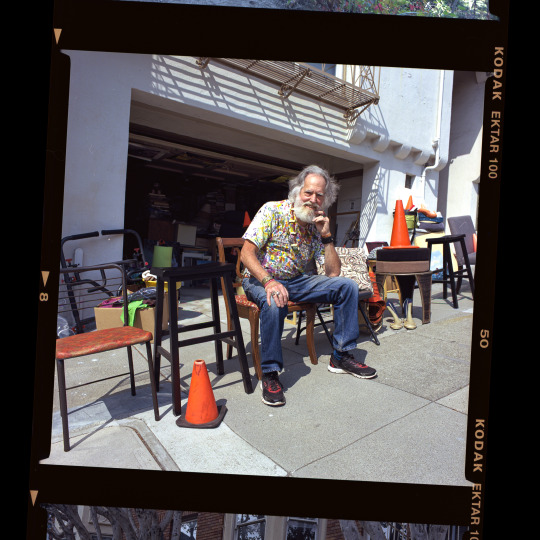
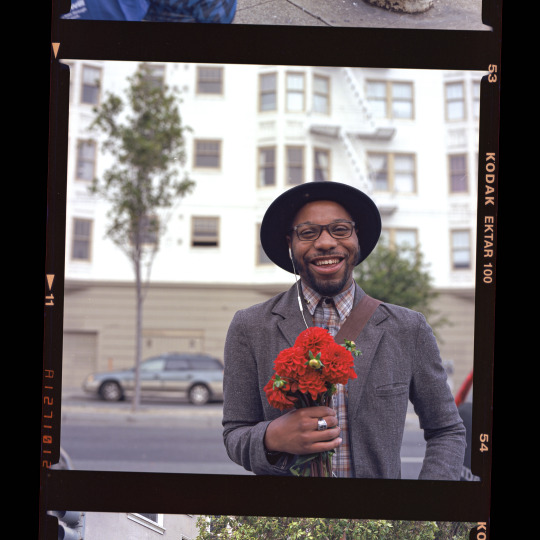
3. Family and friends
I don’t need 691 snapshots of what we ate for breakfast every year. I need just a few quality photos that are engineered to stand the test of time and will always bring back the fondest of memories spent with my family and friends.
Quality photography, where I put in the time and effort to make each shot count (ahem, film, not pointing fingers, ahem). It’s rewarding and it makes my relationships feel that much more special (sorry for the sentimental cheese).
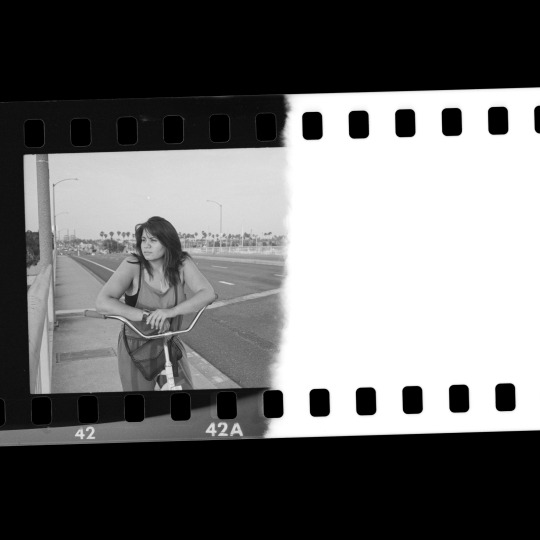

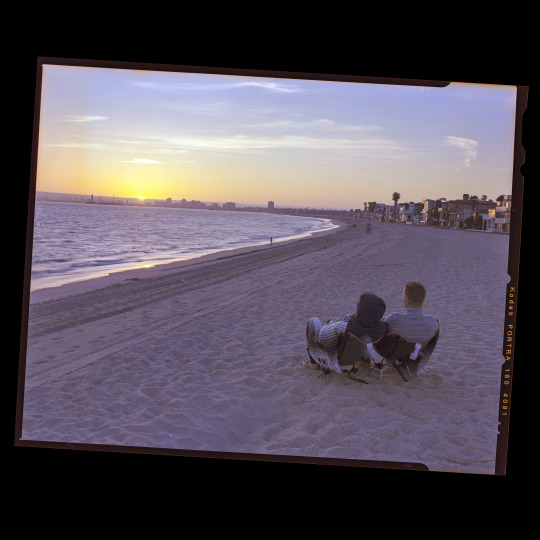
4. Recording milestones
Speaking of family and friends, the moments that we cherish most are the ones that deserve their own dedicated photo shoot. Being a photographer transcends into being a historian and keeper of family history and even tradition.
“Production values” are high, trips are planned, adventures are had and lasting memories are made. Photos serve as testament to us and the big advancements in our lives - a big move, getting married, having children…

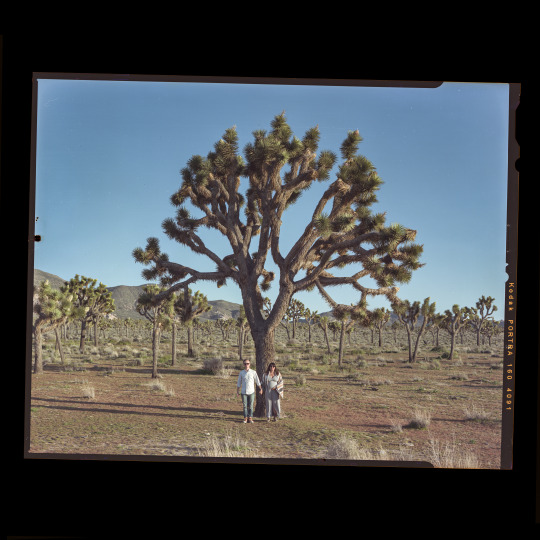

5. Fueling curiosity
To be curious is to be human. It’s what defines us as a race that’s able to advance and grow. There would be no fire, no wheel, no semiconductor and no landing on the moon and (gasp) no Instagram.
Taking photos for me is a continuation of that fine tradition of discovery. I see, I like, I take a photo. I obsess over the photo and object that lies herein. I learn more about it, wiki-ing about the design decisions on that olive green ’67 Cutlass or the impact of that historic Main St. movie theater on the town or how surfboards are shaped. Or why the moon is sometimes red. Or why Dingbats have such a funny name.
Photography helps me learn more about my world. Always a nice thing.


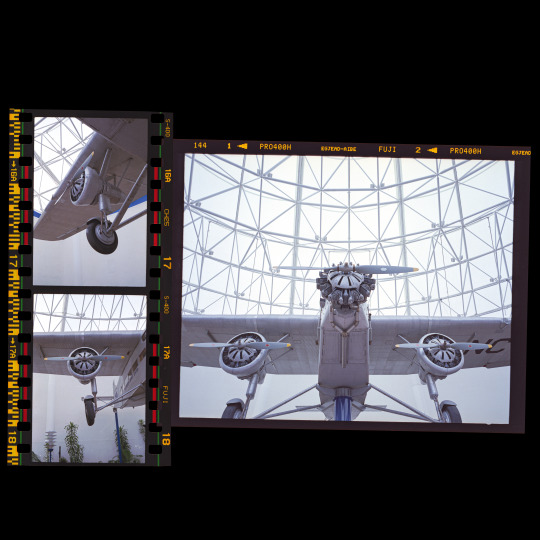
6. Imagination exercise
Every once in a while I’d take a photo and it would entertain my mind in many not-so-obvious ways. Could happen with a picture perfect landscape or a failed Holga long exposure. It would mysteriously linger in memory for a while, prompting repeat viewing. Often times the effect would be immediately after seeing the photo, other times it would surface years after the fact.
I would be drawn to the photo, get lost in it, imagine myself in it. All sorts of metaphorical thought would crawl into the picture, all sorts of things would form in the shadows and bubble up. Sometimes nostalgia would paint the skies a dull yellow and I’d feel warmth in my toes that I haven’t felt since 17. Sometimes at night, the skyline of Port of LA turns into Port Town from F-Zero and at midday, the sand dunes on the beach turn into a romanticized version of early 20th-century Arabia.
Humans are visual creatures, and photos have the power to play all sorts of tricks on the interplay between imagination, memory and all the 5 senses. Photos help me tie my mindscape together.


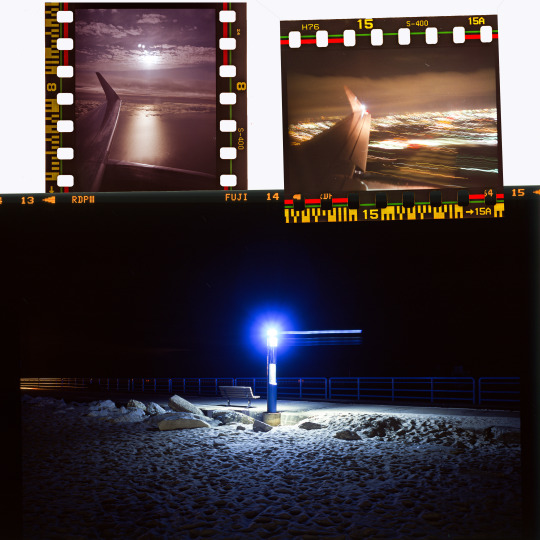
7. Giving back
It’s only natural to want to share with the world something that you truly, honestly love!
Photography is a craft that has lots to do with understanding fundamentals, repetition and learning from your mistakes. It also has lots to do with many other things that are not so immediately obvious due to the exceedingly esoteric nature of what makes or breaks a good photo. Not to mention that there’s a very complicated technical side to photography as well, film or digital...
The answers to all of these come with time and experience, and as always, with a little help from our friends. As such, it’s always a humbling and enjoyable experience when I can offer my friends a little help of my own, based on my personal experience and observations.



8. Experimentation and happenstance
Photography has always been about experimenting - seeing what works and what doesn’t. Every time I try something new I am faced with fresh and, dare I say, invigorating challenges.
Sometimes I learn something cool that I’d like to continue doing (redscale or Pen-o-ramas). Other times I find a format that completely changes the kinds of shots I’d do for long stretches of time (half frame or a 6x9). Or I would find a camera so unpredictable that I wouldn’t know how the shot will turn out at all (pinholes, Holgas, solarcams, old soviet cameras, etc).
In the world of film photography, there is absolutely no shortage of film, formats, cameras and techniques to try out. We have, after all, more than a hundred years of photographic legacy to fall back on and tinker with. It keeps things interesting and the perspective - fresh.



9. Getting lost in the moment
This is a big one, especially with film photography. A craft so diverse and expansive that condenses down to a singular moment when the shutter goes off. There’s so much to love, so many details to enjoy.
Starting with the obvious - not having to chimp or preview the photos and being limited by a scarce, diminishing resource (film) allows more time to bask in the surroundings and bond with the moment rather than just keep popping off the camera like a machine gun. Waiting for the moment (or setting up the shot), anticipating the scene, watching it all come together. It’s meditation.
The gear, so varied and spanning such a breadth of generations, each with its own intricacies, procedures and character. The mechanical, tangible nature of control manipulations. It’s all very tactile and ASMR-ish. Come on, all you Leica fans out there - tell me you don’t go through an elation every time that cloth goes sssssshwick, haha )


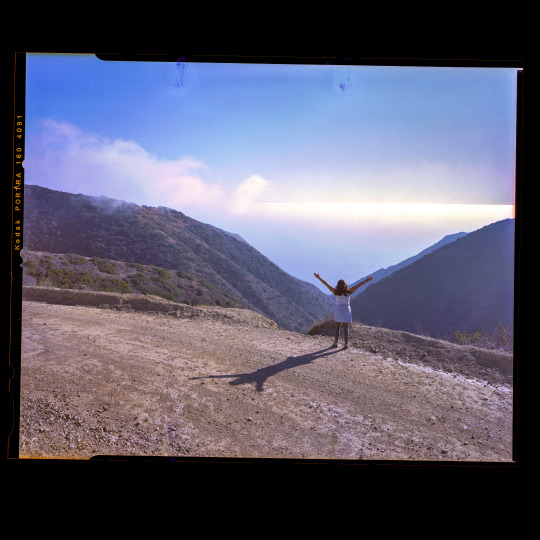
10. Feeling the passing of time
Photos are like a quality wine - they get better with age (I actually don’t know if that’s true, but that’s how the saying goes). A lot of photos we admire today were received completely different when they were first presented to the world. We look back at the photos from the 60’s, 70’s and go through a portal to that time. How people lived their lives, where they lived, what they drove, how they had fun. It’s all put through the context of history. Same goes for movies, music - any cultural item.
It’s important to understand that your photos, if you choose to keep them around for that long, will be viewed many decades down the line and will offer a glimpse into those times. Viewers from the future will look at the cars and marvel at how people got around in these dead-dinosaur-powered vehicles, or how everyone on the street was stuck staring down at tiny glass screens, or even the fact that the very photo they’re looking at is static, isn’t an immersive 3D experience and has limited resolution.
Things get especially interesting when the photographer himself is the subject of the photos...
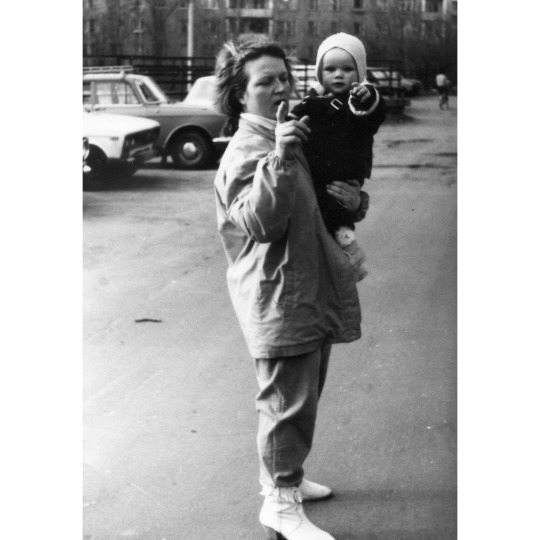
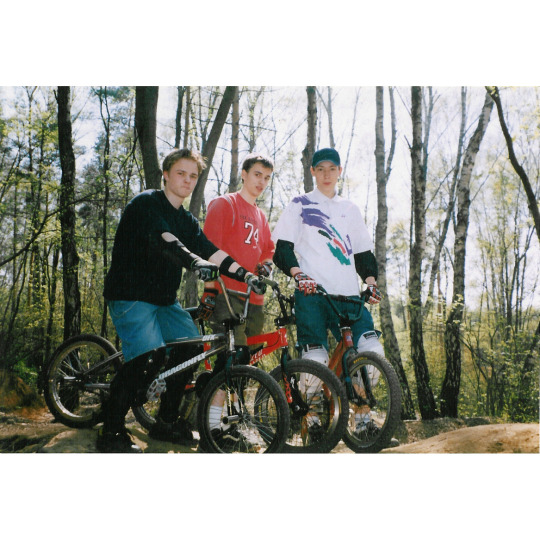

11. Cars
Wait, didn’t I say it was 10 reasons? Well, there’s always room for cars! Awesome, timeless automotive examples, each with its own personality and style. As they say, there’s always room for cars...




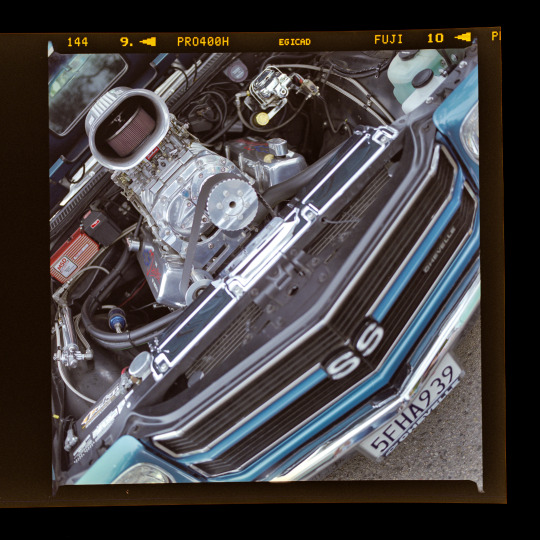





Conclusion
Sorry if that was too wordy! A lot of reasons, huh? And everybody will have their own… That’s the beauty of this thing called photography - everyone makes it their own. Hopefully this post presented you with some interesting food for thought, or maybe inspiration for your next photo project. Thanks for reading, everyone.
Stay awesome!
#film photography#analog photography#filmisnotdead#ishootfilm#film#fujifilm#kodak#35mm#120#4x5#believeinfilm
3 notes
·
View notes
Text
20 QUESTIONS FOR: TAMMY SALZL
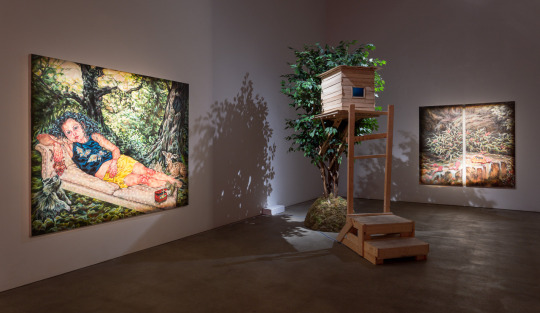
image courtesy of the artist and DC3 Art Projects
1.Name:
Tammy Salzl
2.Occupation(s):
Artist, Sessional Teacher in Senior Level Painting at the University of Alberta.
3.Where are you from and what is your education?
I was born in Edmonton, AB, into a gigantic dysfunctional family with 18 aunts and uncles, 42 first cousins and barely one parent. I spent my summers being tortured as an English speaking city slicker in French speaking prairie farm communities. Retreating into art and stories and animals was the salvation I didn’t find in the fundamentalist religion I was periodically thrown into. For my undergrad I did 2 years at ACAD (Now called AUArts), and finished my BFA at the University of Alberta. I received my Masters in Studio Arts (Painting) at Concordia University in Montreal 2014 and have been expanding my practice to include video and multimedia installation since graduation.
4.Where do you live/work (neighbourhood/city/country)?
For the past 3 yrs I’ve been splitting my year between the Southside of Edmonton, AB. and Parc Ex in Montreal QC. I have family in both places, which makes this both possible and necessary.
5.Does your location affect your practice?
Definitely! Emotionally, psychologically and logistically. I’m lucky to be able to spend time in both eastern and western Canada. Sometimes they seem like entirely different worlds and it’s a privilege to be able to step into both. It broadens my field of vision.
6.What is your favourite tool in the studio?
I have two favourite things. My glue gun, because I love glueing stuff, it makes me feel like a little kid again! I also love it when I have a fresh, unused brush in hand.
7.Where do you look for your source material?
Everywhere! Movies, books, (I love sci-fi books, and I just finished 2 books by Yuval Noah Harari - Sapiens and 21 Lessons for the 21st Century - so gooood!) mythology, ecology, weird/wondrous animals (like the barrel eye fish or the Aye-aye), bus stops, Edmonton’s River valley, back alleys in Montreal, weird stop motion animations, the fresh sights, sounds and smells that come with travel, looking at art and, occasionally, the bottom of my wine glass.
8.What is you daily art world read?
I email subscribe to a bunch of art blogs (like Hyperallergic and artdaily.org etc), and I also try to read Border Crossings and Canadian Art magazines, but honestly a lot of my art world reads come from instagram. Cuz you know… pictures.
9.What is your daily non-art-world read?
I love science and nature blogs. I really enjoy nature.com, naturecanada.ca, futurism.com/, and for quick global news stuff I like Quartz Daily Brief. It’s hard…you don’t want to be ill informed yet it’s so bleak out there…I think overexposure to media can be harmful. I try to find a balance.
10.What role does writing play in your practice?
Sadly, not much. It’s an inescapable task for every artist, and one I dearly wish I could escape. That said, aside from the necessary evil of artist statement/proposal/grant type of writing, I sometimes play at creative writing. I make little one page tales that turn into paintings, or I write a short narratives based on something I’ve made. I’ll often have automatic writing embedded in my underpaintings, and if you look hard enough you can sometimes find traces of a word here and there.
11.What role does research play in your practice?
Because I peddle in tales, I research the history, culture, psychology, pop culture, philosophy of whatever traditional tale or mythology I’m referencing, and how others have interpreted those tales over time - even if I’m referencing something like Dr. Seuss. I often tie that into the research I do out of my interest in ecology and nature. For me, working representationally means there is intension in everything. I try to have layers of meaning and make work that engenders multiple interpretations. I research the symbolism and history of objects, places, animals, colours , etc. With my installations there is a lot of material research involved as well.
12.What role does collaboration play in your practice?
Since expanding my painting practice into intermedia work, I’ve done quite a bit of collaborating in the form of “I don’t know how to do this technical thing so I need to find someone who does”. It’s taught me a lot in terms of learning to communicate and work with others. As a solitary person, it’s a challenge for me, but I also find it incredibly rewarding and enriching. Also, a couple of years ago 4 female artist friends and I began an art collective called IFPP (incubator for phantom pregnancies) We’ve staged a couple exhibitions and have some upcoming shows, and it’s been really great. You learn a lot about yourself in a collaborative process, and it’s exhilarating ending up with this thing you helped create, but in a mind hive kind of way.
13.How does success affect your practice?
Ideas of success are pretty subjective, no? Speaking in terms of non-commercial success, I would say it helps drives my practice forward. It gives you the incentive and confidence to keep going, to make more, to take risks and think bigger. Sometimes commercial/monetary success can do the opposite because you’re expected to make more of the same, sellable stuff - to keep the formula and not colour outside those lines.
14.How does failure affect your practice?
Failure is an opportunity to learn, and can lead to amazing things. I suck at it. I can be super stubborn and fight with a painting that’s not working for days and days. I’m often my own worst enemy. I’m learning to walk away, to turn the bloody thing facing the wall and only come back to it when I can be more objective - when I’m in a better place to paint over the 100 hours invested and start over.
15.What do you identify as the biggest challenge in your artistic process?
My own stubbornness! My own rules and obsessiveness and need for control. I can get restrained by fear of making something ‘bad,' and I struggle to let myself play more, to let myself ‘fail’. I can get too caught up in my own head. I struggle with a lot of self doubt. A dear friend of mine recently sent me a beautiful quote by Robert Hughes in an attempt to assuage my doubt:
“The greater the artist, the greater the doubt. Perfect confidence is granted to the less talented as a consolation prize.”
I’m not so sure this is the case, but it’s nice to hear!
Also, like so many of us, I struggle socially and will hide in my studio rather than go to an art opening when I know I should be trying to make “connections”. Wine helps tremendously in all my struggles.
16.Who are some historical artists you are thinking about?
This fluctuates a great deal. I often find myself interested in artists I thought I didn’t like years ago, and will lose interest in artists I thought I loved. Art crushes come and go. I just bought a Frida Kahlo book and am rediscovering my fascination with her.
17.Who are some contemporary artists you are thinking about?
Everyone and no one in particular. I was in LA last January and saw an amazing Outsider Art show at LACMA. There was a piece by Greer Lankton titled, “Candy Darling” depicting a transgender actress who was featured in several of Andy Warhol’s films and was one of Lankton’s icons she looked up to as a trans woman. It’s exquisite with an edgy sexuality - totally blew my mind. I also saw some Mark Bradford works at The Broad that really surprised me. You have to be in front of them to understand how profound, beautiful, raw and sophisticated they are.
18.How do you describe what you are making now?
Right now I’m bouncing all over the place with various mediums. I’m working on a new series of oils, sort of taking the piss out of patriarchal old fables and the misogynistic way they portrayed women by retelling them through a contemporary lens. I’m also making a series of small, intricate “naughty fairies” made out of Sculpey (imagine tinker bell-like creatures going down on each other), some larger installation pieces that incorporate a variety of materials - video, sound, found and crafted objects, and I just completed my first short narrative video with footage shot on an artist residency I did in Norway last year.
Sometimes I feel like I’m spreading myself too thin and there’s an invisible pressure to focus on one thing, but I’m a storyteller and I use whatever mediums best suites the tale. I think everything I do remains distinctly me, it all has connective threads. Generally I paint in the morning and move onto video and sculpture in the afternoon/evening. Painting is mentally challenging in a very singular way; it’s super humbling and I need a fresh, rested brain to do it.
19.Who is an artist that you think deserves more attention?
Oh man. Too many to count. Seems to me art world trends often translate into amazing artists not getting their due. I think Canadian artists in general deserve more of the international spot light. There’s so much talent here.
20.How can we find out more about you (relevant links etc)?
I keep my website pretty up to date, including upcoming shows and press links etc.
www.tammysalzl.com
2 notes
·
View notes
Text
Talked about this on Twitter, but felt I'd share here as well.
I failed my first attempt at the PTCB exam yesterday, and have to wait two months before I can attempt to retake it. Unfortunately by that time, my pharmacy technician license will have expired because I can't renew mine until I pass the certification exam. What this means is that I will be out of a technician job come the end of March.
I have been so stressed since getting my results because I've been panicking that this meant that I'd ultimately become unemployed come April 1st and that I'd be back to desperately trying to find any job available (even going back to the food industry or seeking employment at Walmart, both things I've been adamant that I'd never do even in the most desperate of times because 1, working in the food service made me come home every day wanting to kill myself, and 2, Walmart is the cause behind my injured back, I was at absolute odds with how upper management was running my department into the ground just to compete with a newly opened grocery store, and they were bastards enough to ultimately fire me [after I had already quit, I might add] because I had to call in on my final three days employed there because my back was in so much pain at the time that I literally could not get out of bed and even the slightest movements caused spasms that had me screaming in agony. Just getting to the phone to be able to call in and report that I wasn't in any ability to get to work was torture to me at the time. And they had the gall to fire me, for injuries I sustained while at work, MONTHS after I was no longer employed and well after I had given them my two weeks notice [even if the reason I gave them for quitting was that I was returning to school after working with the company for several years, which technically was true I just didn't also say that it was because they refused to even take into consideration the instructions my physical therapist had given them so as to NOT further damage my back and that I felt that if I stayed there then it would be to ultimately watch my department die under their insane idea that a SINGULAR SECTION OF THE STORE —THAT CAME TO BE LESS THAN A QUARTER OF THE ACTUAL SIZE, STAFF, AND CUSTOMER TRAFFIC COMPARED TO THE REST OF THE STORE— COULD POSSIBLY COMPETE WITH A NEW STORE THAT SPECIALIZED 100% IN WHAT OUR QUARTER DID]. So needless to say Walmart is absolutely at the bottom of my list of places I would ever want to try to work at again).
So it's understandable that the past 24 hours have not been the best for me and I've been on the verge of an emotional breakdown because I've been terrified that I won't have a job all because I failed my 1st attempt at this exam.
I got to talk with upper management today about this, and they assured me that, come the end of March, they will rework me into the front end schedule while I attempt again to take the test, and would keep me employed up front until I managed to accomplish that.
Sarah, our store manager, also assured me that I'm not alone in failing the test the way I did. I had the worst possible luck with what questions I received and it was primarily all hospital focused and the few bits that were on the pharmacy were almost all regarding machines and technology that I have not experienced at either store I've worked at. She told me that almost everyone she's known, unless they work in a hospital or are going through a nursing program, has failed that exact version of the test if they got it.
She also said that she would talk with her old store to see if their pharmacy, which does have that equipment, would be willing to let me work a few days over there so I could become familiar with it, as the only time I've ever encountered anything to do with that stuff was when I did my initial training/introduction/learning computer program. When I was first hired. Well over two years ago.
My direct manager was not at work today so I haven't been able to talk with Mina about what's going on and to try to even see, while I can't be employed in the pharmacy until I pass and get a new license after March, if she could hold my position so that when I do pass and have a renewed license, I could just come back and get put back onto the schedule.
I have two more attempts (technically three, but the wait period between attempt three and attempt four is longer and if I fail attempt four then I have to start everything with the pharmacy, including classes for it, all over again) at the test, and I do have a safety net in the form of an additional test I learned about from a customer, that only focuses on pharmacy work, if things get really bad. However the safety net is not a test my work will sponsor, though they will accept the certification from it, and from what I was told it is not only a certification that requires being renewed every year but is also one that is only available to technicians that have failed the PTCB exam three times.
WITH THAT ALL SAID...
I'm still stressed and an emotional wreck over the results for a couple of reasons. The biggest of which is that testing has always been a struggle for me to accomplish and do well with. The moment an exam is placed in front of me, everything in my head goes blank no matter how calm or how hard I studied, and that has led to some rather poor grades (and self-destructive behavior) when I attended college. To me, passing this exam, especially on the first try, was not just about being able to keep my job, but to try to prove to myself that I could do it. That if I focused and studied harder than I ever had before, that I could manage to do well and succeed. And that I might be able to apply that same effort back into college as I tried to pursue my actual end-goal career. And I did study hard for this exam. Hells, I continued to cram and study to the point where I was almost running late to the exam location. And I still failed...
And it makes me feel like all that effort was worthless. That no matter how much I try to succeed, that all that exists for me is failure... And that even my own ambition to try to go back to school and do better and become an English professor would be just a futile dream and a waste of not only everyone's time, but also what little money I have to my name.
And a second, equally important reason why this is still hitting me so hard is that, even though I know that a major factor in this failure was the focus of the questions I randomly got, I'm struggling to allow myself to even believe that the failure is just the result of an unlucky draw and NOT a reflection of my personal abilities as a pharmacy technician or a person.
And that directly ties into the first reason, this test was so much more personal to me than just something I needed to do for my job... It was about being able to show myself that my past issues in school were not indicative of my current capabilities. That I could succeed. That maybe there was hope for me with returning to school.
I had so much riding on passing this the very first try, and it's all come crashing down all because of little more than bad luck, not my own knowledge.
But that's something incredibly hard to try to convince myself of, because to me this is just another failure on top of a planet of failures for me.
I've broken down four times today over this already, and had to force myself to keep it together whenever customers were around.
I have two months to prepare again.
I just hope that my randomly selected questions are more focused on what I'll actually know and not on a portion of the job that I have no experience at all with again.
#long post#venting#even with the assurance of remaining employed I still feel like a complete failure#and that I have no outcome ultimately outside of offing myself
2 notes
·
View notes
Note
Could you tell us who the current superheroes are and what their powers and general reputation is? Just to keep track of them. (And maybe the same for villains if that's not too much!)
You know I think I might add a codex in later in the game to help the MC keep track of this very info. But for now- I’ll give you a couple of the major players (both current and past, since sometimes even memories of people have an effect on the present)!
I didn’t give away any real spoilers since technically the MC knows most of this and the player will learn it all rather easily and pretty quickly, but still under the cut for those who wish to keep it a secret for now!
Heroes:
Atlas (passed) - Atlas was perhaps the most powerful hero to have ever existed. Some thought they were a deity, fallen from the heavens here to reshape the world as they desired. Most of those people were, admittedly, fanatics. In truth, Atlas never did… much. And what they did do cast a shadow of doubt on whether or not they could really be considered a hero at all. But calling someone that strong a villain was a terrifying prospect all on its own. Not that anyone has to worry now, they died several years ago, and now their legacy is left to nothing more than whispers of a dead deity, an apocalypse that never came.
Their powers were… hard to pin down. They could… change things. Change them to whatever they desired, give the nonliving life or turn the breathing to stone and metal- they could make solids into liquids and vice versa seemingly without changing any other aspect of their nature. Or they could change the substances entirely- turn silver to gold, wood to metal, gas to air, dust to grain- whatever they desired.
Nymph - Nymph was one of the two who were thought to take up Atlas’ title of most powerful hero. She was beloved by most people as a fair heroine who always seemed to be there whenever anyone was in trouble. All in all, she was very well liked before she just… stopped. She didn’t stop heroing entirely, mind you, but it seemed as if Nymph started dropping off the face of the earth time and time again. Now she’s most famous for her rivalry with the minor villain Bugbite. This has soured her reputation considerably, to the point where most people don’t speak about her fondly, and usually the kindest remarks is that she’s ‘a hero from a past time, far past her prime’.
Her powers include control of all living, organic matter. However the more complex the life-form the harder it is to control, so she mostly sticks to plants. (However her most famous exploit was controlling a massive attack by a now-deceased villain who attempted to turn a deadly bacteria into a bioweapon that would’ve wiped out Nickelport if she hadn’t contained it.)
Elapine - Elapine is more often referred to as a hero of East Bay than he is a hero of Nickelport. He is extremely popular in the East Bay community, and has almost become something of a hero mascot for them. However, outside of the East Bay his popularity fades a bit, though he is still loved, there’s more tension to his praise considering he very rarely moves out of helping just the East Bay area, and some say it’s selfish for a hero to choose who to help and who to ignore. However, most everyone agrees that due to his influence, the East Bay is no longer Nickelport’s most deadly area, which has opened up a lot of trade and tourist opportunities and generally helped Nickelport’s economy greatly. He is also famous for being the one hero to work closely with Atlas, a reputation which has both bolstered as well as tainted his reputation, due to Atlas’… controversial nature.
Elapine rarely uses his power, actually, since it’s more… immediately lethal and he’s known for non-lethal tactics. However, his power is a poisonous touch, and in turn a resistance to most toxins himself.
Lady Luck* - Lady Luck’s reputation is… a bit in the air right now. She was a well-loved hero back in the day, but she retired quite a while ago and had begun to fade from the memory of most Nickelport citizens. However, she’s returned from retirement just recently, and now most people are hopefully holding their breath to see if the hero they loved so much is back once more.
Lady Luck’s power is tricky one… It’s exactly as her title implies- a control over luck. However what that means changes from context to context- and she can’t control how it’ll come into play… but most people realize when they’ve been affected by her powers.
Sentry - Sentry is just starting to make a name for themself. They’ve been around for a while as a quieter hero presence but have recently come under both scrutiny and praise for their radical ideas for change. Sentry is the leading face in an attempted to create a more organized system of heroics. They’ve been public in their wish to forge the way for a kind of heroes’ union, and have been working closely- or trying to work closely- with Nickelport’s government to make that happen. There are… mixed opinions about whether or not this could be Nickelport’s saving grace, or if it’s a disaster waiting to happen.
Sentry’s power is a bit like your basic forcefield. They create temporary solid figures, seemingly from nothing, that vary in breadth and width and can be used for a multitude of purposes- including the classic shielding, but also a platform in mid air or even as a weapon.
Lullaby - Lullaby, also known as Madeleine Briggs, is famous first and foremost for the fact that, despite still possessing a heroic alias, she has never hidden her identity- nor does she wear a mask. According to Madeleine, it’s an act of owning up to what she does as a hero- of taking responsibility for her actions. While the reaction is somewhat mixed, it’s definitely more positively leaning, and has earned Lullaby a solid reputation as one of Nickelport’s most famous heroes- even though she hardly ever speaks to the press, and most of her statements are curt, single-sentences or silent nods. Lullaby has also recently garnered a bit more fame for openly expressing an interest in aiding Sentry’s hero organization process. Which, from what little can be gathered from her silent nature, is because she believes that a systems of checks and balances could do a lot of good for the heroes, and the people they’re supposed to protect.
Lullaby’s powers are, as you might have gathered from her name, to put people to sleep. However, it’s not quite her voice that does it, but rather a mist that she can breathe out on command. A kind of knock-out gas that she can control.
Stillwater (passed) - Stillwater was the second of the two heroes who was thought to take on Atlas’ reign. He was greatly beloved by all and often pointed to as the example of a what all heroes should strive to be. He was public and unafraid to speak with the people, even seen taking casual strolls around town or chatting with people on the street when the recognized his outfit and called out to him to talk about… well… anything! The weather, his favorite TV shows- Stillwater was most well known for bragging with great gusto about his daughter and how proud he was of her, even to villains waiting to be taken away by the police after he’d apprehended them. He always kept a tight lock on his identity, though, as he explained that he refused to put his family in the kind of harm’s way that would come to be should anyone evil had ever found out who he was. Other than that, he got about as open and public as a man with a secret identity could’ve been- even working publicly with the NPRC. That was, until he was killed in the Lotown Mining Incident, when a cave collapsed in and Stillwater rushed in to save the people inside- he managed to save most of the miners, but was ultimately trapped underneath the rubble and killed with several others.
Stillwater’s power was essentially to learn. In short, he could copy most other powers he came into contact with, albeit in a much lesser form. In his time as a hero he was able to learn flight, some enhanced strength, the ability to heat up and cool down his body temperature, enhanced durability, communication with animals, and a couple others.
Red Light - Red Light is a new hero on the scene. He hasn’t done much yet, despite this, has already garnered a rather wide and passionate following. He is well-loved by those who know him and is often referred to as ‘The Next Stillwater’ for his open, charming personality. Though he’s still new on the scene so it’s hard to say where he’ll go from here.
Red Light’s power appears to be paralysis. Though it’s hard to tell since he hasn’t been in many fights. but that seems to be the leading theory on what he can do.
Villains;
Sweet Sound - Sweet Sound is infamous and terrifying as a phantasmic figure with a multitude of rumors surrounding her. She’s become something of the boogeyman of Nickelport, with no one really knowing what’s due to her influence, and what isn’t- where she’s going to strike next, or if she’s ever going to strike at all.
Nobody knows her powers.
Likewise - Likewise is… god. What can I say about Likewise? Likewise is Nickelport’s Most Wanted- the most powerful villain alive whose track record extends all the way from minor robbery to killing a hero (or two, or three). There’s no rhythm or rhyme to what Likewise does or why Likewise does it. Only one thing is for sure- everyone, and I mean everyone, knows who they are.
And almost everybody wishes they didn’t.
Likewise’s powers have two layers to them. The first is mimicry- they can mimic any singular power of a person nearby them. The second aspect is nullification- they can nullify the powers of anyone in range. What’s important, and kind of tricky, here is that while they can mimic only one power, they can nullify… almost all powers in range. (Granted, in order to nullify or mimic, they first have to get close, but once a power is nullified, it will stay that way for quite a while, ditto with mimicry.)
Domino* (retired) - Domino was a rather infamous villain most well known for his rivalry with Lady Luck, mostly due to the similarities in their powers. However he retired about five years ago, and hasn’t been seen on the villainous scene since then. However with Lady Luck’s return to heroism there’s been some speculative whispers about whether or not this will goad him out of retirement as well.
Domino’s powers were very similar to Lady Luck’s. However, instead of simply changing luck, he has the power to change the result of any specific event. The new result is randomized, and though others will remember the previous result any of its effects will be neutralized- as if it only existed in memory.
Oppenheimer - Oppenheimer is a relatively young villain who has made a bit of an explosive entrance into the villainous world. (Pun wholly intended) Like most villains she’s not exactly well-liked. Most people fear her for the fact that her attacks seem to come without warning, and almost always target upper-class areas that should be better protected- yet she never seems to be noticed or caught until after her attack is finished.
Oppenheimer hasn’t been in enough fights to really understand what her powers are. But they most likely have something to do with explosions.
Valkyrie and Harbinger you all already know. So I’ll spare you from a rewrite of what you know, but they’re also on the well-known-villains list.
Groups/Others:
The Honeybees - They Honeybees… hmm… ok, I think I actually do gotta call some spoilers here. You’ll… meet them soon.
:D
Mambo’s Gang - Mambo’s gang is something of a hospital system for villains exclusively. They’re located somewhere on the Rusty End, but even if someone knows, they don’t dare go after Mambo or anyone who works for him out of fear for the backlash from the entire villainous community- not even the worst of the worst would dare lay a finger on someone under Mambo’s protection, either out of fear for their own health the next time they need severe medical help, or out of fear for the influence Mambo has in the villainous community.
Generally, those who actively know about Mambo’s Gang and aren’t villains dislike it, but not even heroes can deny that the neutral, no-fight territory that Mambo’s created is useful, if for no other reason than they don’t have to worry about protecting people within that area.
Ever since the disbanding of the NPRC, there’s been more tension surrounding Mambo’s hospital services. Heroes are left using the public hospitals, which while mostly works, the safety and secrecy of Mambo’s services are very tempting… But he doesn’t seem willing to extend his services any time soon.
The Nickelport Powers Research Cooperation (disbanded) - The NPRC (as they were called) was a lot of things. On one hand it was what Mambo’s Gang was for villains but for heroes- a hospital and medical facility. On the other hand, it was a research and development company- running tests with (voluntary) cooperation from heroes like Stillwater and Alchemist. It published papers on the nature of powers and discovered how they were passed down from generation to generation- and from person to person. They also had begun a series of technological developments meant either to aid heroes with their work against villains or simply to make everyday life easier and safer when the next great battle of the century could go down next door.
They were shut down quite a while ago, quietly and without explanation.
Some speculate that it had to do with the loss of Stillwater, who the NPRC often referred to as their greatest asset for his power’s flexible nature. Others think that the reason was… something else.
Alchemist (retired) - The Alchemist was… well… She was known, she was liked- perhaps even loved- and then she… stopped. She was a hero, and was perhaps going to be the most powerful hero before Atlas. She was, also, very very popular. With an almost meteoric rise to fame that fizzled out as fast as it began. She just… announced that she was retiring. She did some work with the NPRC afterwards but… never really came back to the spotlight after that.
Her powers were to change the substance of things. She could make solids into liquid, liquids into solids, gases into liquids, and all other variations, and bend them to her will. She could even turn one kind of substance into another with ease.
It was rumored that she was related to Atlas, considering the similarities in their powers.
After her retirement it became known that her real name is Ulla Parker, via a Rust article on Atlas while they were still active.
Igneous - Igneous is most widely known as a villain… yet it’s clear that he doesn’t think of himself as such. Often proclaiming himself a ‘protector of the innocent’ and ‘One of Nickelport’s saviors’. Still, between the mass destruction and cross-fire casualties that he causes he’s not… exactly well liked. As either a hero or a villain.
Igneous has the power to melt any part of his body into lava. This also comes with a minor regenerative/defensive aspect, as cuts or injuries that are melted will often return better than they were before, and any weapon that passes through a melted part of him does no actual physical damage so long as it didn’t touch his actual skin but the lava instead.
*A fun side fact: In the early, early, early version of Model Citizens, Lady Luck and Domino were the same person with the same personality and powers. In fact… they were a bit of a Raf and Lucy 1.0- the original choices for who you could be married to. (Only just the pronouns and appearences changed, they were still the same person back then, unlike Raf and Lucy now, who are entirely separate personalities and characters.)
25 notes
·
View notes